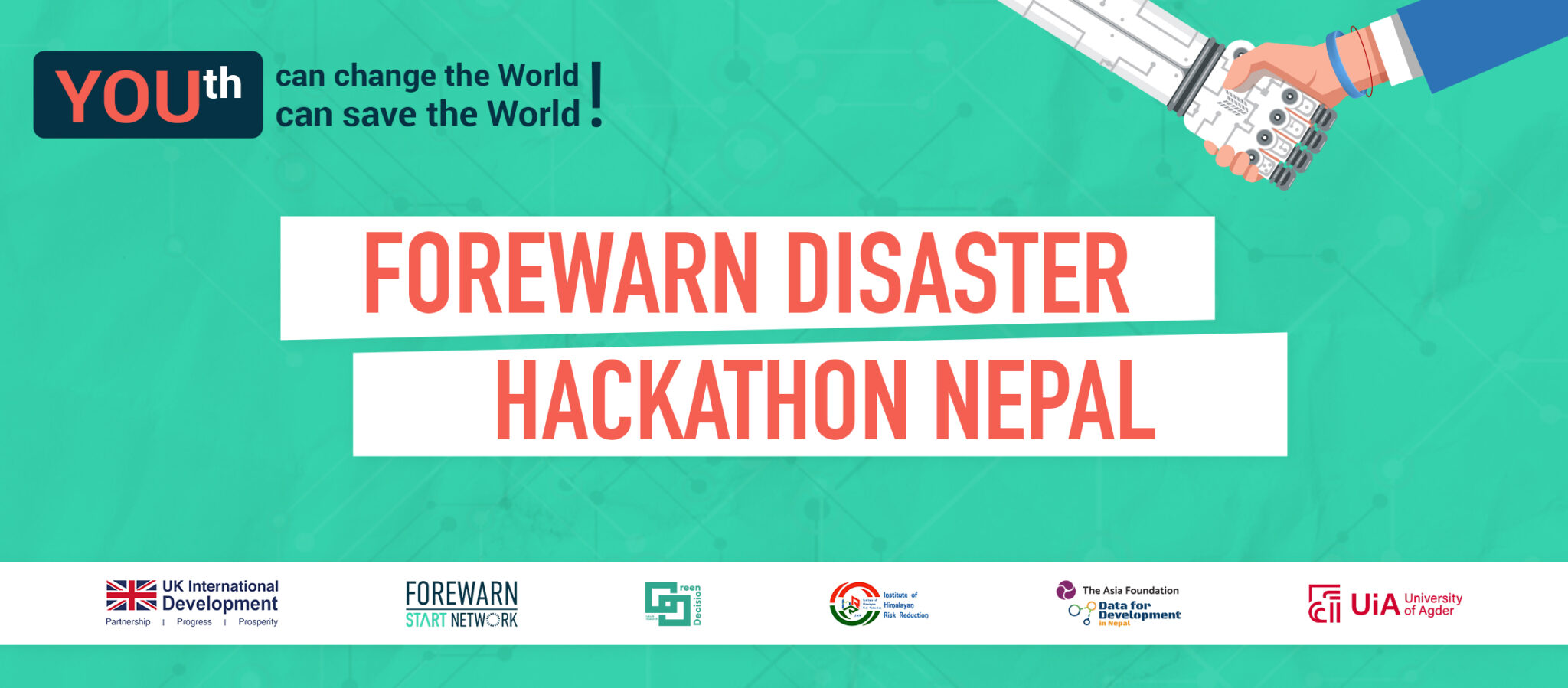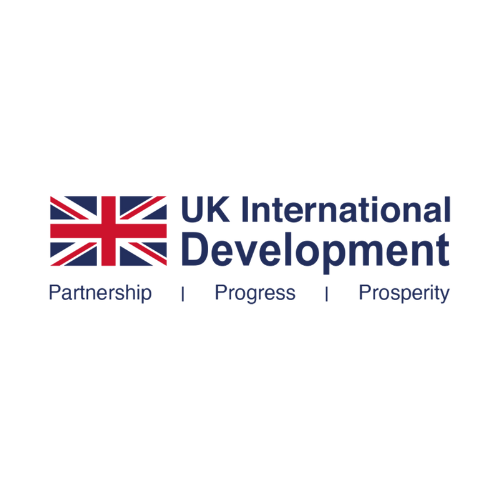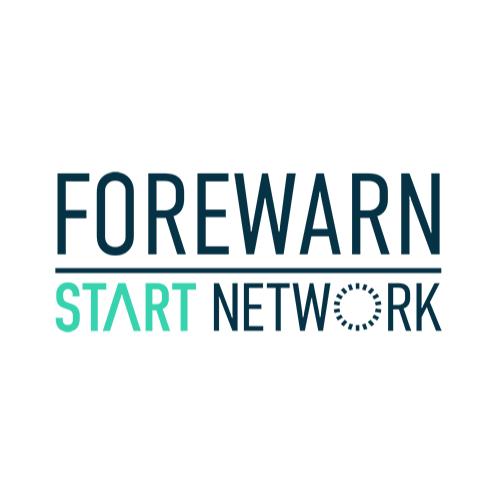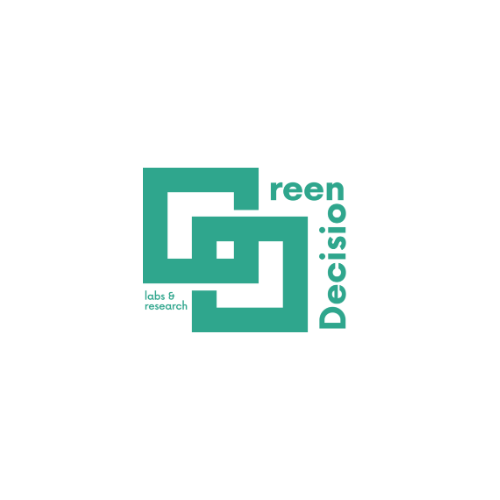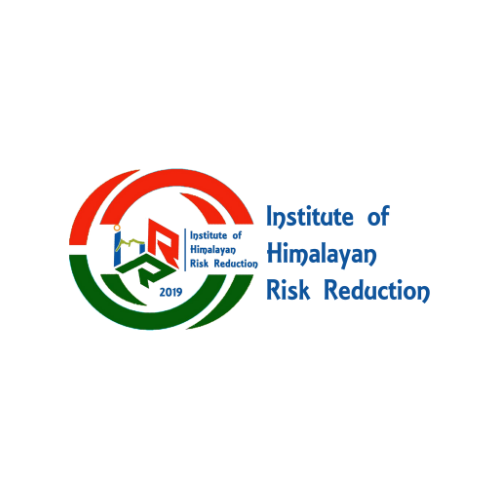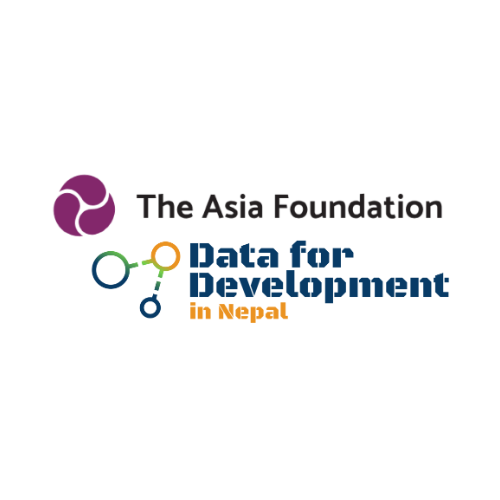FOREWARN Start Network, in partnership with Green Decision Labs and Research (GD Labs) and the Institute of Himalayan Risk Reduction (IHRR), proudly presents Nepal’s first-ever FOREWARN Disaster Hackathon. This initiative aims to inspire and empower young minds to create innovative solutions to pressing humanitarian challenges. The primary objective of the hackathon is to enhance the capacities of young professionals and enthusiasts in Disaster Risk Reduction (DRR) and Anticipatory Action (AA), equipping them to implement these critical actions at local levels.
The FOREWARN Disaster Hackathon is a pioneering project that seeks to advance disaster risk management and anticipatory action in Nepal. By engaging university students and researchers, the hackathon encourages the development of cutting-edge prototypes that leverage technology to predict, prepare for, and respond to natural disasters. Participants will tackle key challenges such as hazard forecasting, risk monitoring, and disaster relief management, with the ultimate goal of making a tangible impact on disaster preparedness and response in Nepal.
This initiative not only fosters the development of practical solutions but also seeks to build a vibrant community of young innovators dedicated to improving disaster risk management in their country. The hackathon will culminate in a workshop where the top teams will present their prototypes, with the potential for further development and real-world implementation.
Despite the growing recognition of AA as vital for disaster resilience, gaps in coordination, evidence, resource allocation, and community engagement lead to suboptimal outcomes, leaving vulnerable communities at risk. The FAO estimates that every dollar invested in AA yields seven dollars in benefits, yet communities struggle to access funds, execute plans, and utilize forecasting.
Why FOREWARN Disaster Hackathon Nepal?
Generate Innovative Ideas
Networking Opportunities
Business Incubations
Platform for Idea Initiation
Start Fund Nepal (SFN), hosted by CARE Nepal, is a Start Network program launched in June 2021. It’s a financing mechanism developed by 15 international and 16 local NGOs in Nepal, with support from the global Start Fund and the UK FCDO. SFN follows a 45-day implementation cycle, enabling rapid decision-making within 72 hours of a crisis alert and action within 7 days. Recently, SFN expanded its focus with FOREWARN, a network aimed at enhancing disaster forecasting and early action through collaboration with multidisciplinary experts.
SFN plays a crucial role in delivering rapid, localized humanitarian responses in Nepal. Through its FOREWARN initiative, SFN promotes Anticipatory Action (AA) by helping members raise alerts, disseminating resources, providing forecast information, and conducting capacity-building exercises. However, challenges in deploying timely assistance remain, particularly in logistics, identifying affected households, and procurement, which are often agency-specific and lack creative solutions.
Timeline for the FOREWARN Disaster Hackathon Nepal
Registration open for the FOREWARN Disaster Hackathon Nepal
Final day for the registration of the FOREWARN Disaster Hackathon Nepal
Virtual Kickoff for the FOREWARN Disaster Hackathon Nepal with a webinar for the top 20 participants
Announcement of top 7 groups who will move forward for the FOREWARN Disaster Hackathon Nepal
3-day Residential Workshop with the top 7 participants of the FOREWARN Disaster Hackathon Nepal
Virtual Mentorship (Week 01) with respective mentors of the FOREWARN Disaster Hackathon Nepal
Virtual Mentorship (Week 02) with respective mentors of the FOREWARN Disaster Hackathon Nepal
Final pitch and winner announcement of the FOREWARN Disaster Hackathon Nepal
GD Labs is a research and innovation lab dedicated to building climate resilience in Nepal through the development of innovative, user-centric climate technologies. GD Labs specializes in fostering partnerships, networking among national and international stakeholders, and applying a design-centric approach to creating sustainable solutions. The organization has a strong track record of turning ideas into successful interventions in areas like urban mobility, waste management, and climate adaptation.
IHRR is a non-profit organization focused on preparing risk-informed societies for disaster resilience and sustainable development. Committed to the principles of the Sendai Framework for Disaster Risk Reduction, IHRR bridges academic research with practical applications, promoting science-based decision-making in DRR. The institute has developed several tools for Anticipatory Action, including alerts for landslides, heatwaves, and cold waves, and continues to lead innovative efforts in disaster risk reduction across Nepal.
GD Labs, along with IHRR are working as consultants for this event to embrace the creativities and innovations of students and academia who are at the forefront of technological and research innovations. Some ideas could include the use of Machine Learning and AI in the field of AA to identify at-risk communities ahead of the crisis scenarios or develop models and frameworks to validate and contextualize regional forecasting models in Nepal.
The major objective of this Hackathon is to raise and strengthen capacities of young DRR professionals and enthusiasts in Anticipatory Action, helping them eventually implement these actions and their compounding pillars at their local levels.
Advisors of the FOREWARN Disaster Hackathon Nepal

Dr. Basanta Raj Adhikari
Director, Center for Disaster Studies, IOE Pulchowk Campus

Dr. Dhundi Raj Pathak
President, Center of Research for Environment, Energy and Water (CREEW)

Dinanath Bhandari
Researcher | Freelancer
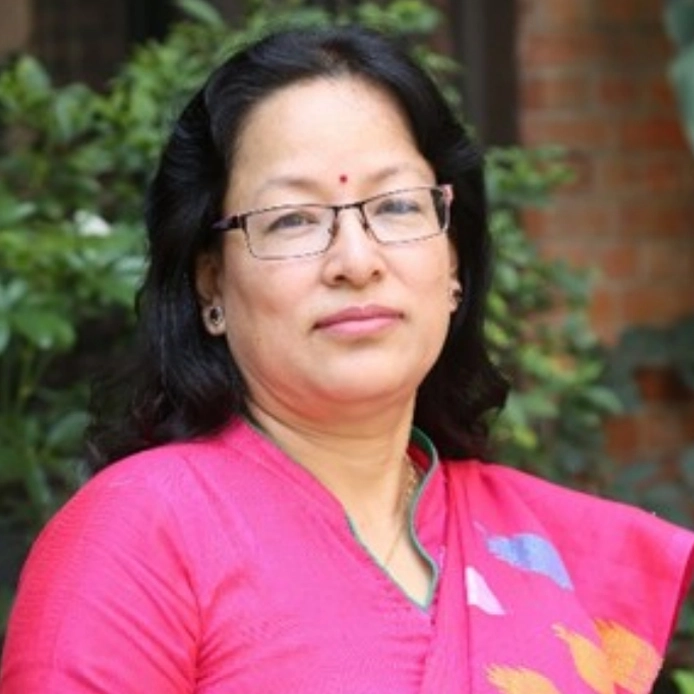
Prof. Dr. Sangeeta Singh
Professor (Urban Planning), Institute of Engineering
Mentors of the FOREWARN Disaster Hackathon Nepal

Aayush Regmi
ML Engineer, Fusemachines
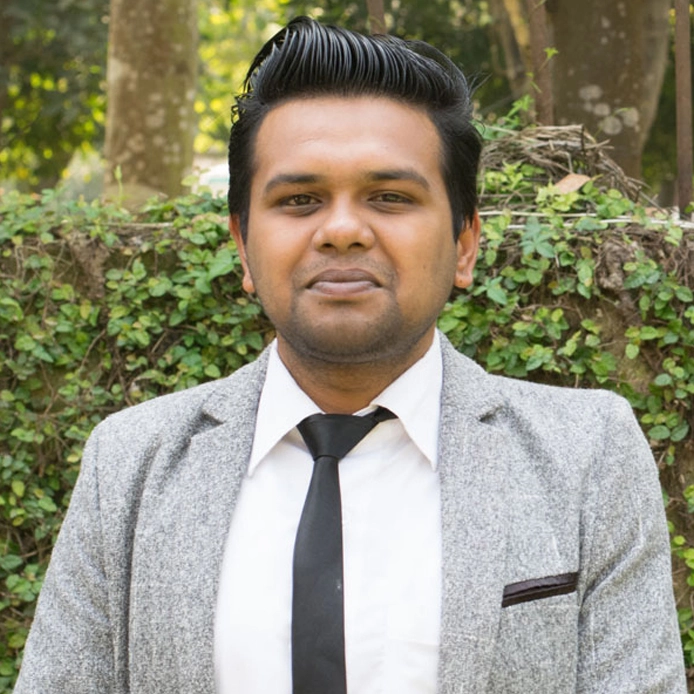
Anish Bhujel
Public Health Expert
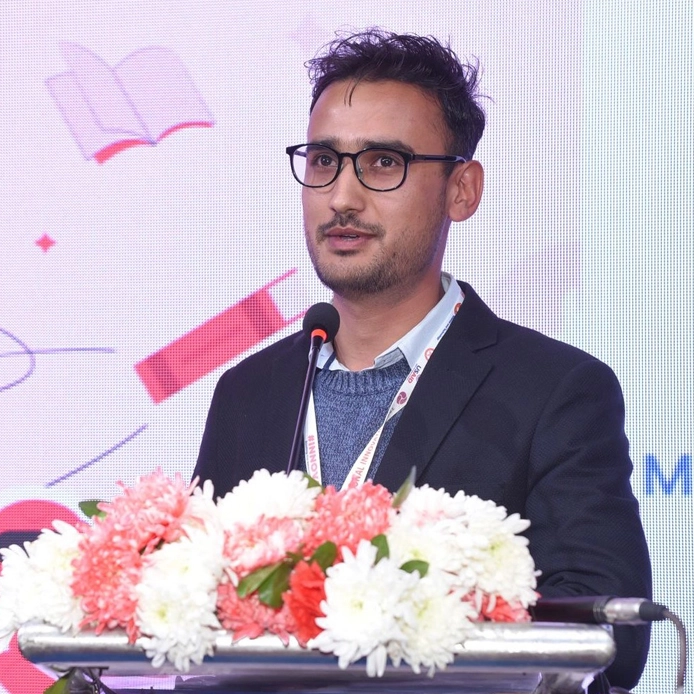
Arun Bhandari
CEO, NAXA Pvt. Ltd.

Rakesh Kayastha
Research Fellow, Kathmandu University
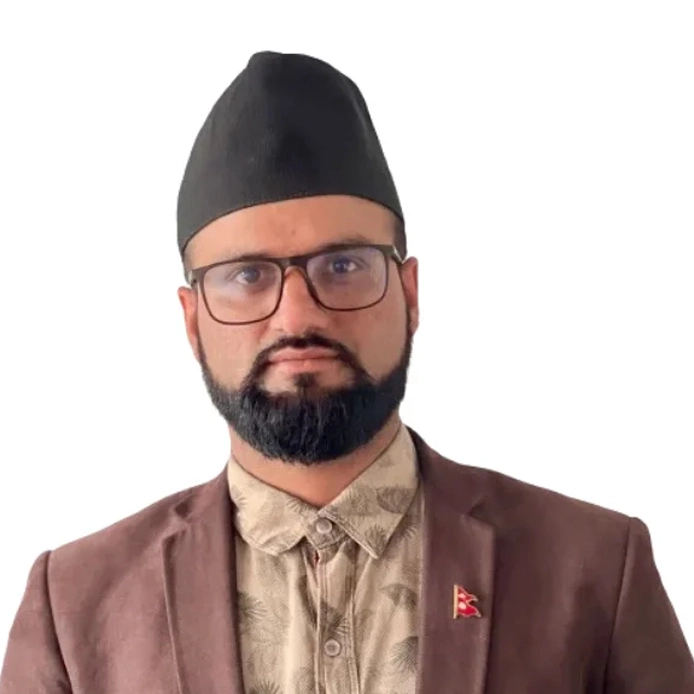
Rishi K. Marseni
Asst. Professor at Nepal College of Information Technology
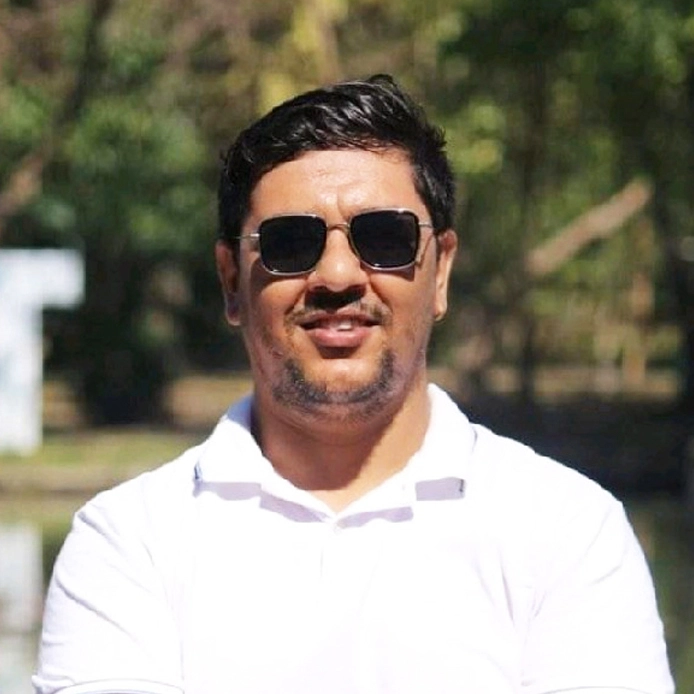
Dr. Sanjiv Neupane
CEO, Smartphones for Water-Nepal (S4W-Nepal)

Dr. Sikha Thapa Magar
Thematic Lead, IHRR
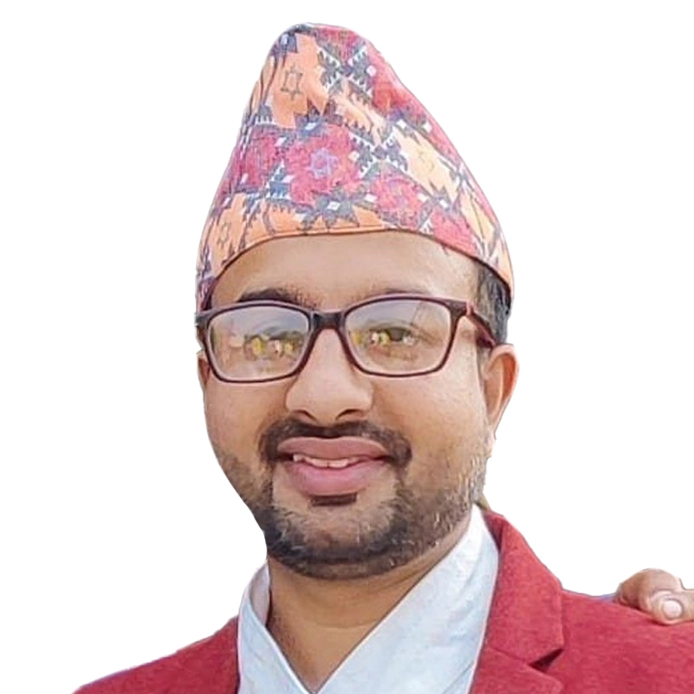
Suman Chapagain
Project Manager, Practical Action Nepal

Sunil Regmi
Lecturer, Kathmandu University
Meet the Top 7 teams of the FOREWARN Disaster Hackathon Nepal
Team Khai Khola
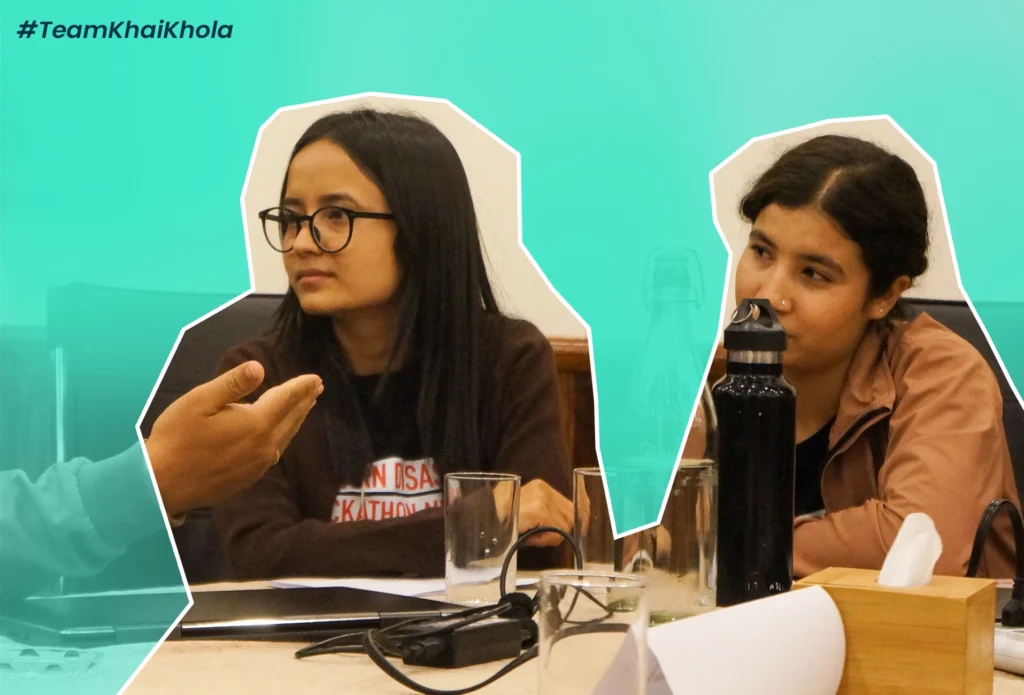
Team Khai Khola presented an Augmented Reality (AR) solution for flood simulation, emphasizing AR’s role in disaster preparedness, knowledge dissemination, and real-time flood representation. By simulating “before and after” flood scenarios, their tool aids in prevention, mitigation, and evacuation drills. Potential applications include educational resources and crisis awareness. The jury appreciated the concept and suggested clarifying the targeted locality and factors for inundation while testing accuracy to validate its real-world applicability. They also encouraged integrating real data to better serve key user groups like the army, police, and local governments.
Members of Team Khai Khola
Jiya Thapa, and Alka Basnet
Team Quantangle
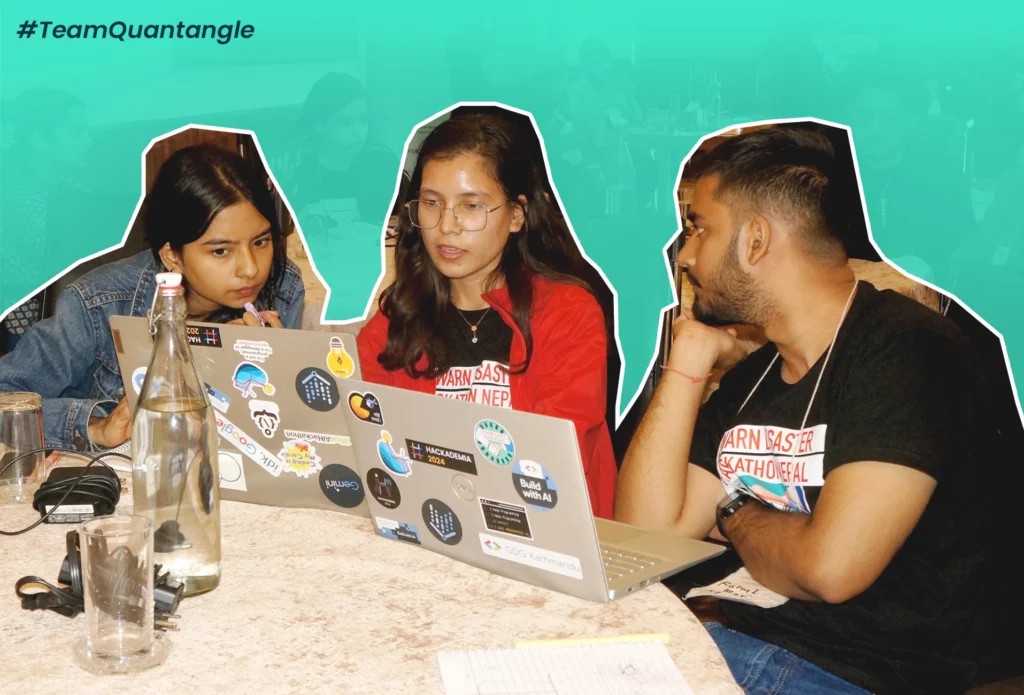
With Nepal’s growing forest fire threats in mind, this team proposed a cost-effective, data-driven solution for strategically placing firelines in forests. The project aimed to begin with community forests and eventually scale up to national forests, with the potential for incorporating thermal sensors to improve results. The judges recommended conducting a more extensive literature review and thoroughly evaluating the feasibility of their solution to strengthen its foundations.
Members of Team Quantangle
Isha Hitang, Rahul Ravi Mahatha, and Nancy Mahatha
Team IT Simplified
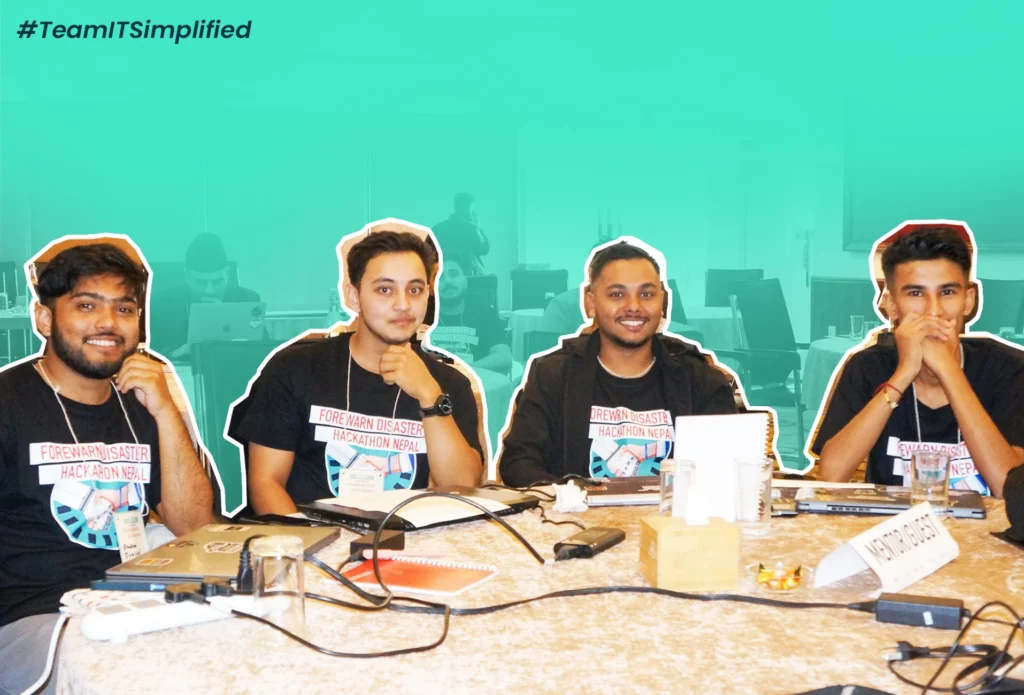
Focusing on disease outbreaks post-disaster, IT Simplified introduced a system utilizing past data and machine learning to create epidemic alert zones. Their solution integrates geospatial mapping, predictive analytics, and communication strategies for risk mapping and real-time solutions. The judges acknowledged the project’s importance and encouraged scaling it to include additional diseases while enhancing collaboration with governmental authorities to amplify its impact.
Members of Team IT Simplified
Padam Prasad Dhakal, Sandhya Gautam, Vinay Poudyal, Prajwal Kunwar, and Suvam Bista
Team Aashraya
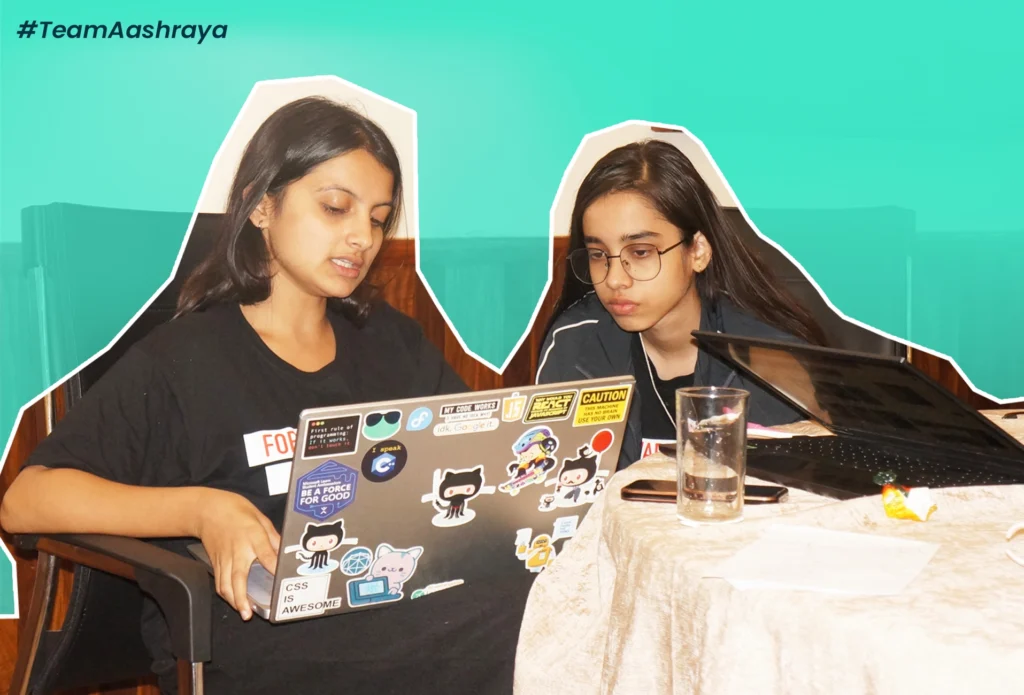
Team Ashraya tackled shelter challenges for disaster-affected individuals with their Smart Floating Rescue Shelter, utilizing polystyrene for buoyancy, a ballast for stability, and solar panels for energy regeneration. The project aimed to offer a sustainable solution for displaced populations. The jury commended the idea but suggested evaluating its applicability in hilly areas and refining features such as sirens to ensure they effectively address the needs of vulnerable communities.
Members of Team Ashraya
Riyaj Nepal, Nibida Ghimire, and Ridhima Bhatt
Team Garud
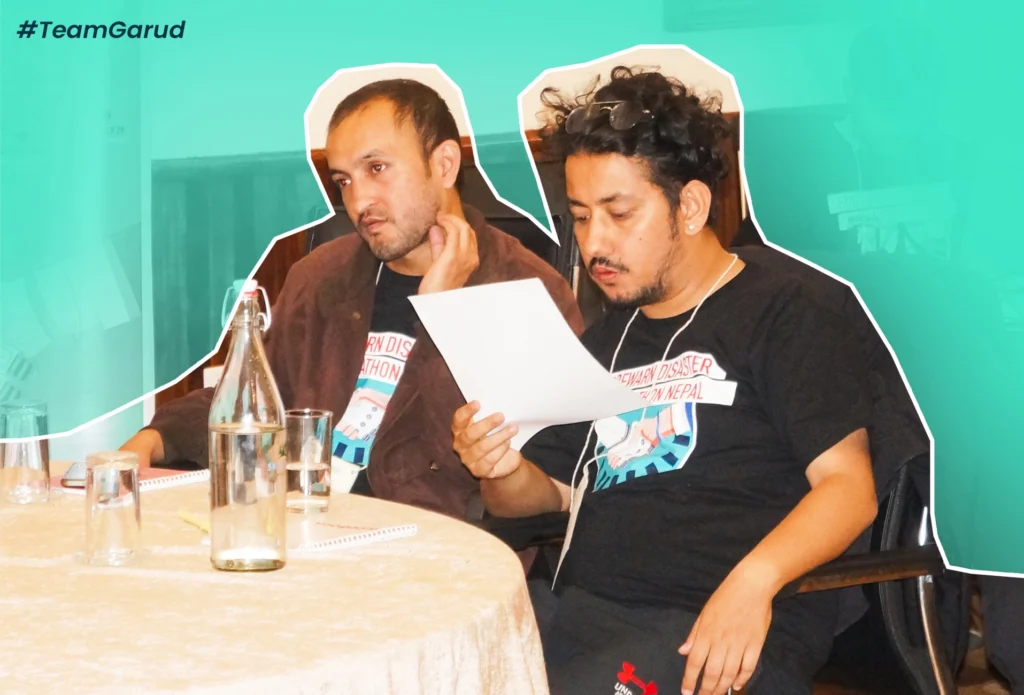
Team Garud addressed delays in rescue operations in Nepal’s challenging Himalayan terrain with their AI-powered Search and Rescue (SAR) drone. Featuring hybrid autonomous navigation, thermal imaging, and life-saving kits, their solution supported disaster mitigation, preparedness, response, and recovery efforts. The judges suggested refining its operational capabilities to maximize its practical use and scalability in diverse scenarios.
Members of Team Garud
Ojaswi Shamsher Kunwar, and Biman Rimal
Intelliaid
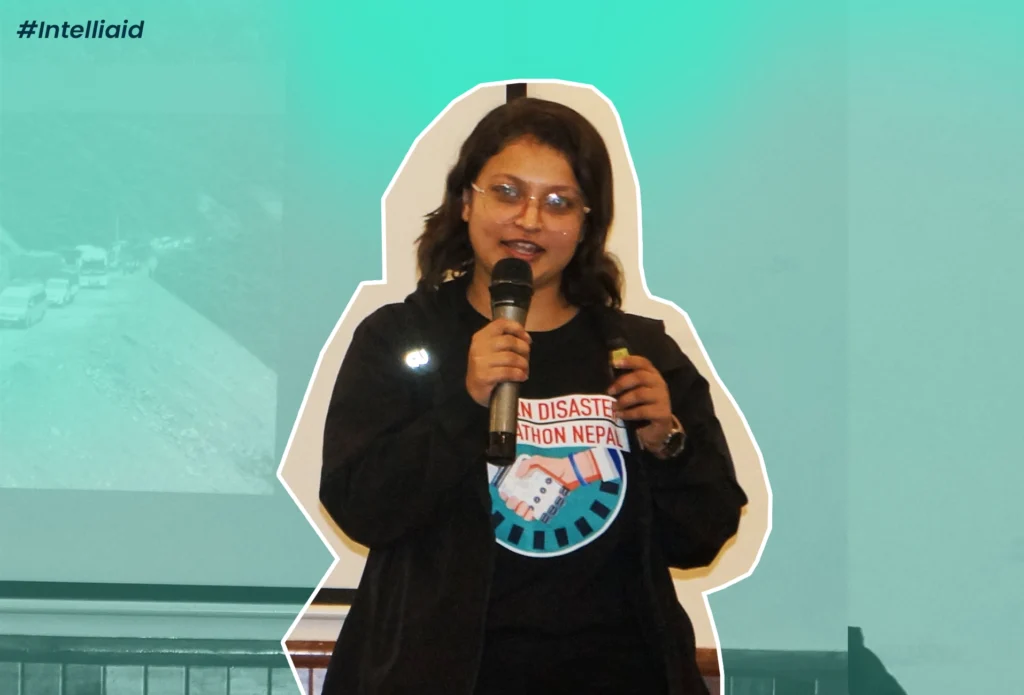
Painting a poignant picture of the issues faced by families during disaster, Intellaid presented a versatile app to enhance disaster response during emergencies. The app offers weather alerts, emergency call features, disaster visualization reels, and real-time situational analysis for better preparedness and management. The judges highlighted the app’s potential, and recommended expanding its reach to include vulnerable groups and carefully addressing the costs associated with its integration into larger infrastructures.
Member of Intelliaid
Elbina Paudel
Team DisasterLens
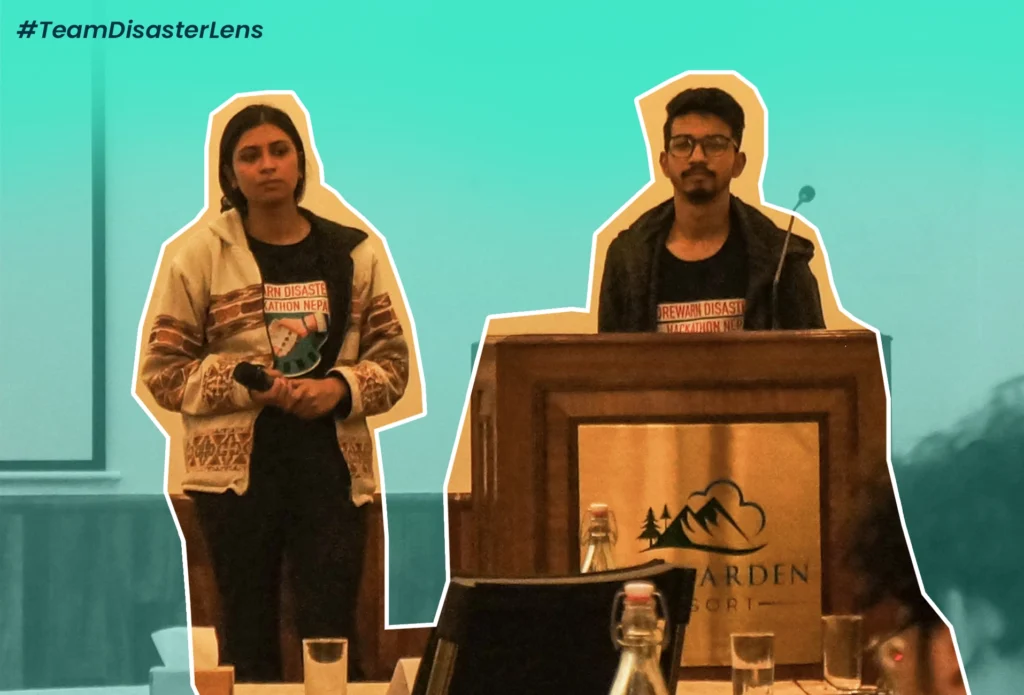
Focusing on combating misinformation during disasters, Disasterlens proposed a tagging system using cosine similarity and location-based conflict mapping. Their scalable solution sought to discourage unreliable news sources and build trust during crises. The judges recommended expanding on how media ethics and responsible reporting could play a crucial role in reducing misinformation during disaster scenarios.
Members of Team DisasterLens
Samshrita Ghimire, and Ankit Kayastha
Day 01 (October 20)
Day 02 (October 21)
Final Pitching Session of FOREWARN Disaster Hackathon Nepal
The Final Pitching Session of the FOREWARN Disaster Hackathon Nepal marked the culmination of an inspiring journey, where the top teams presented innovative solutions for disaster risk reduction and anticipatory action in Nepal. Held on 6th December 2024 at Ramada Encore, Thamel, the event provided a platform for participants to showcase creativity, feasibility, and real-world impact in addressing disaster-related challenges.
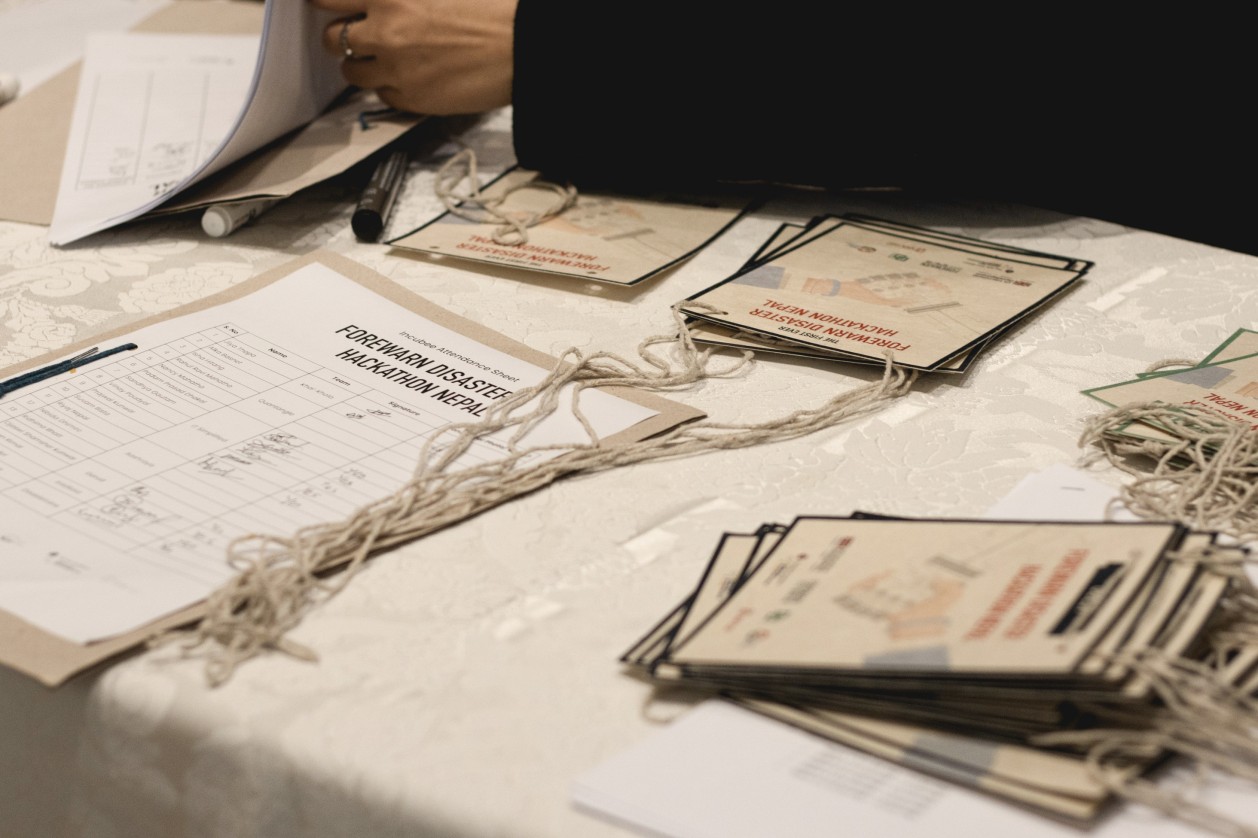
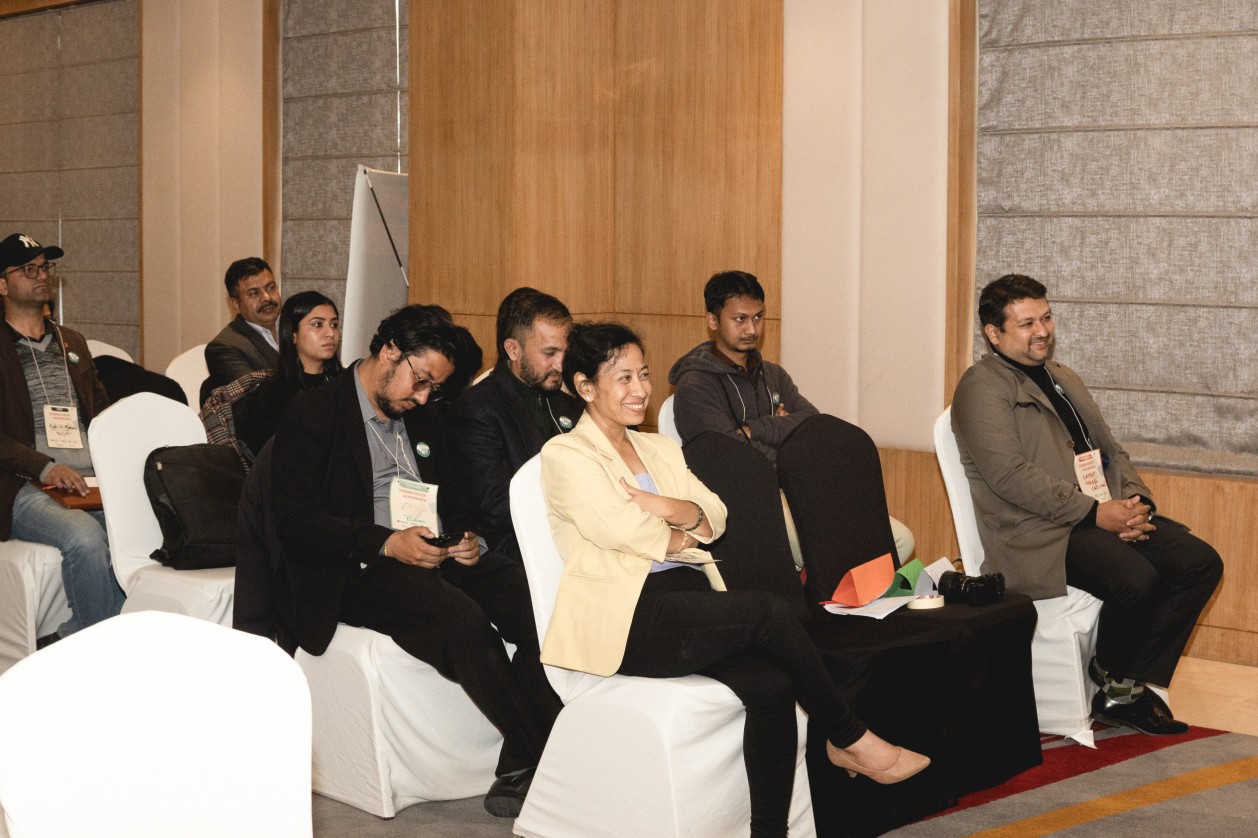

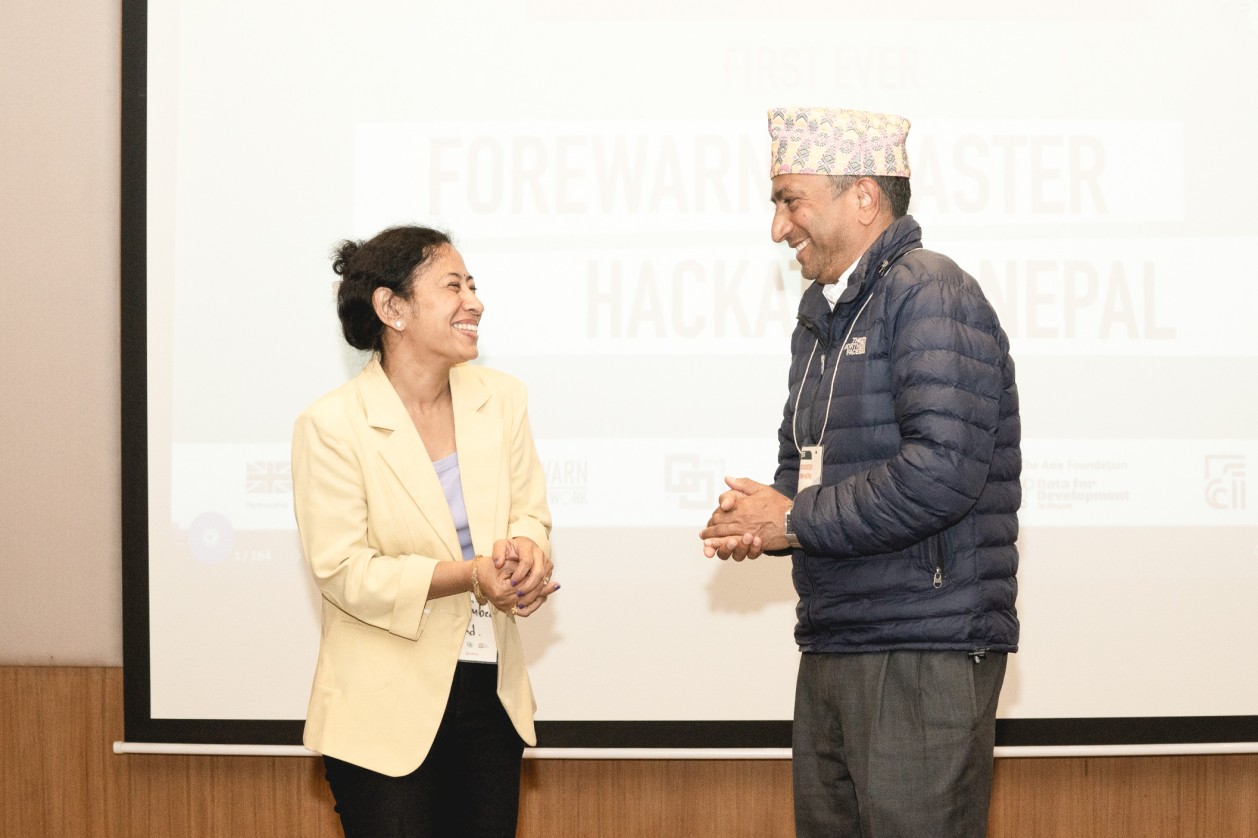
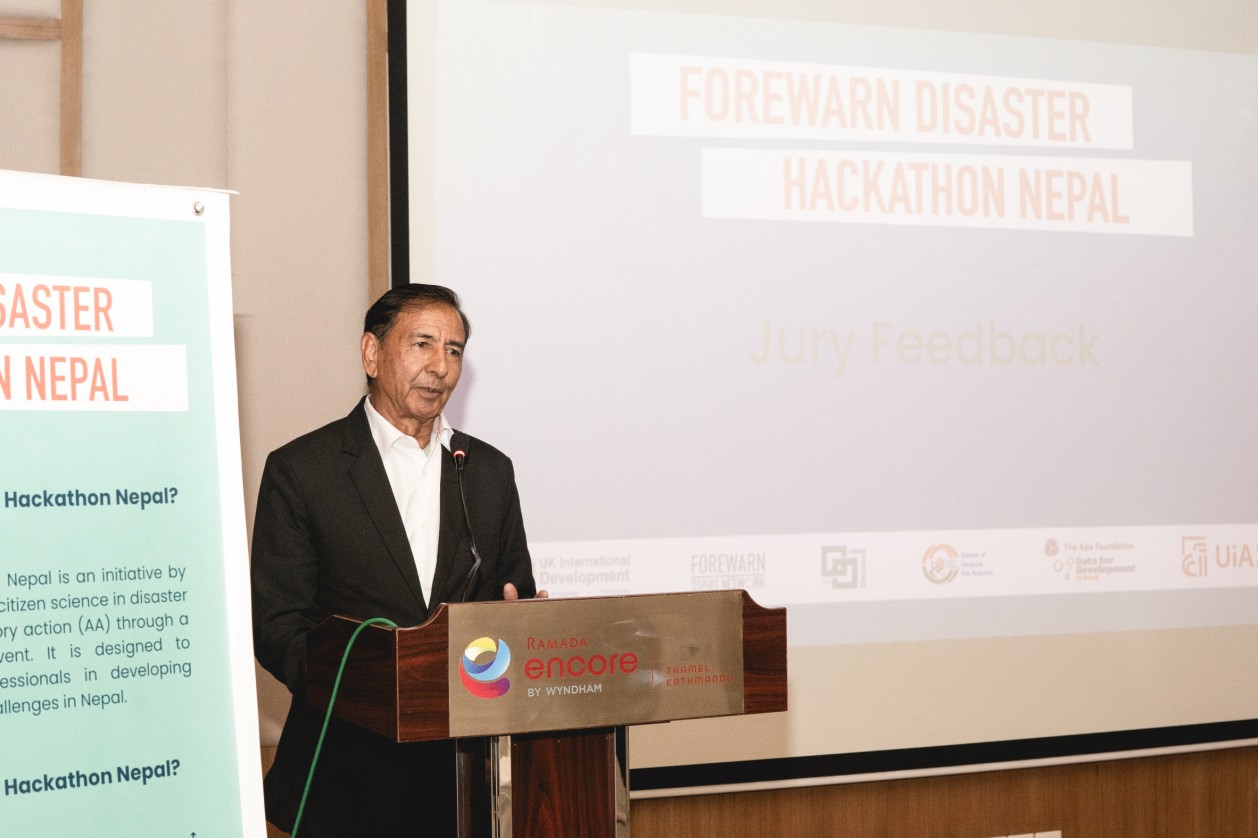
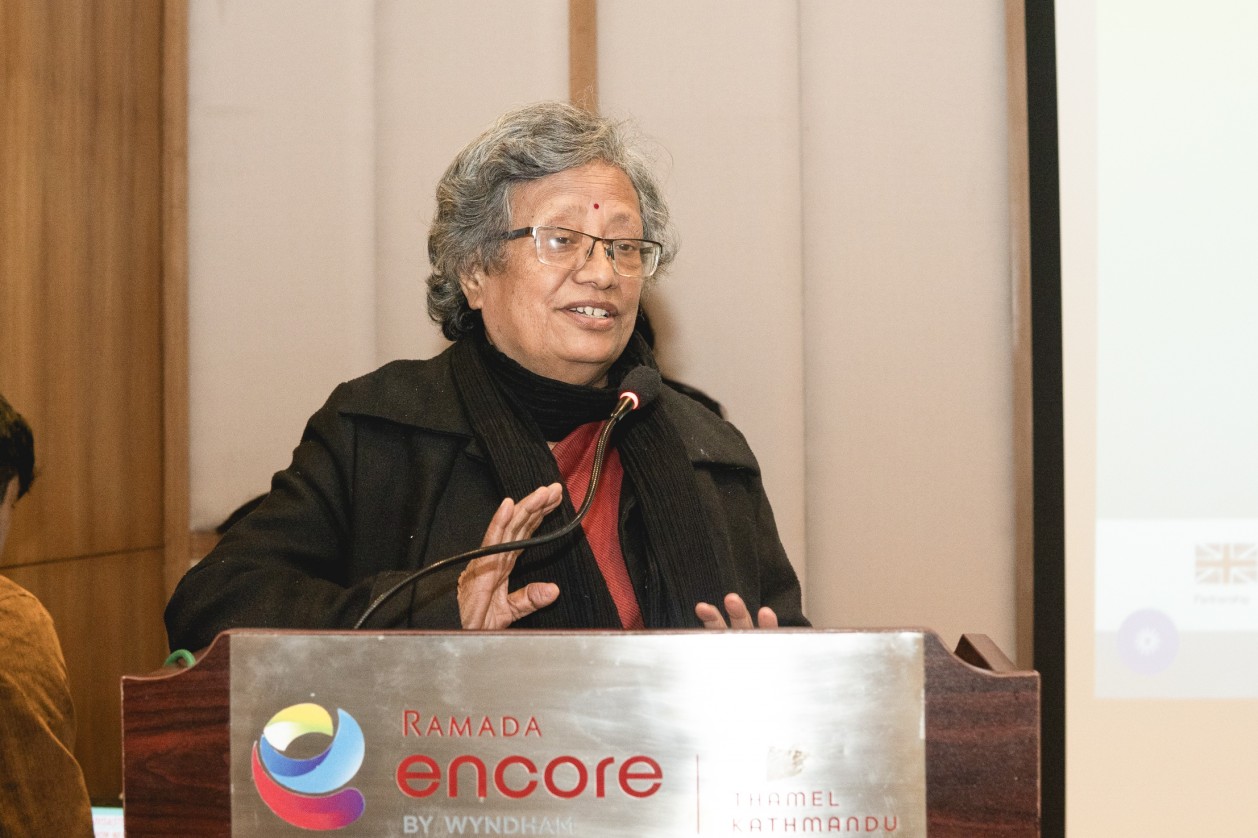
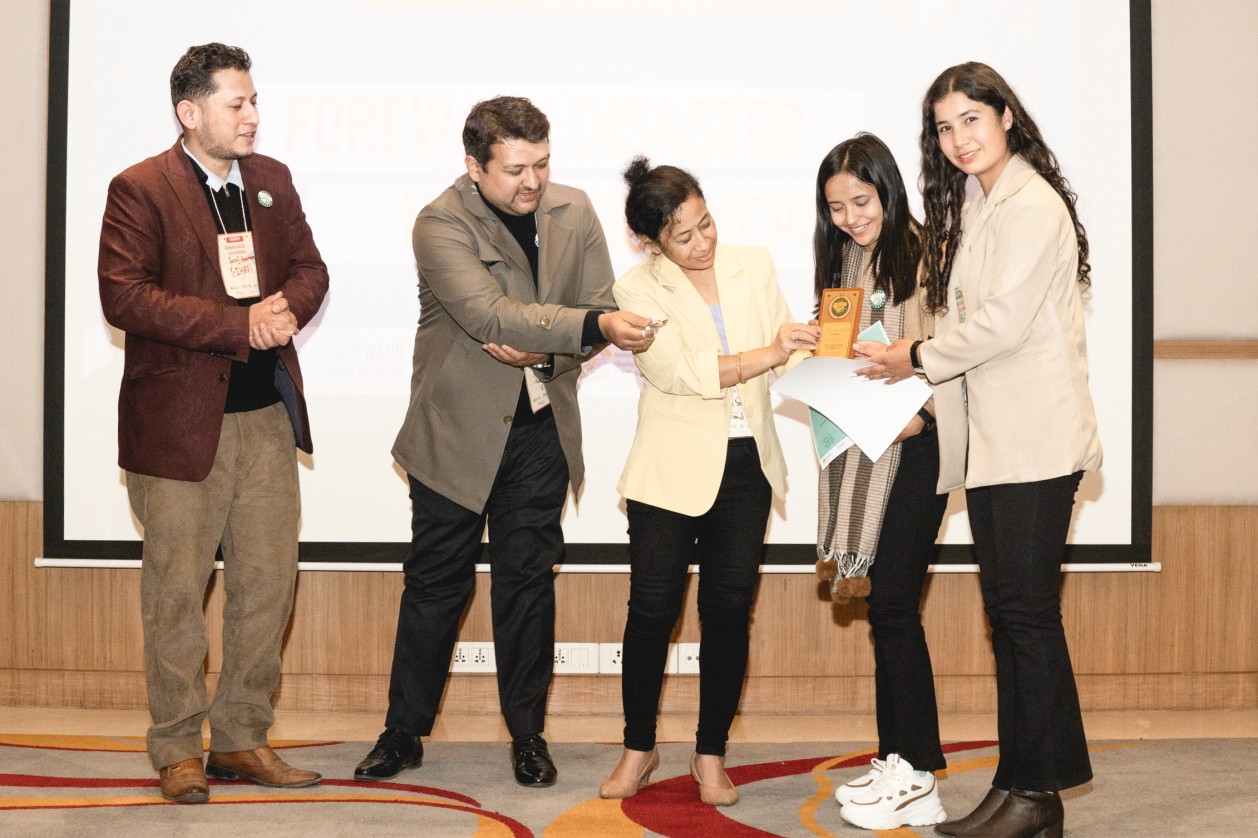
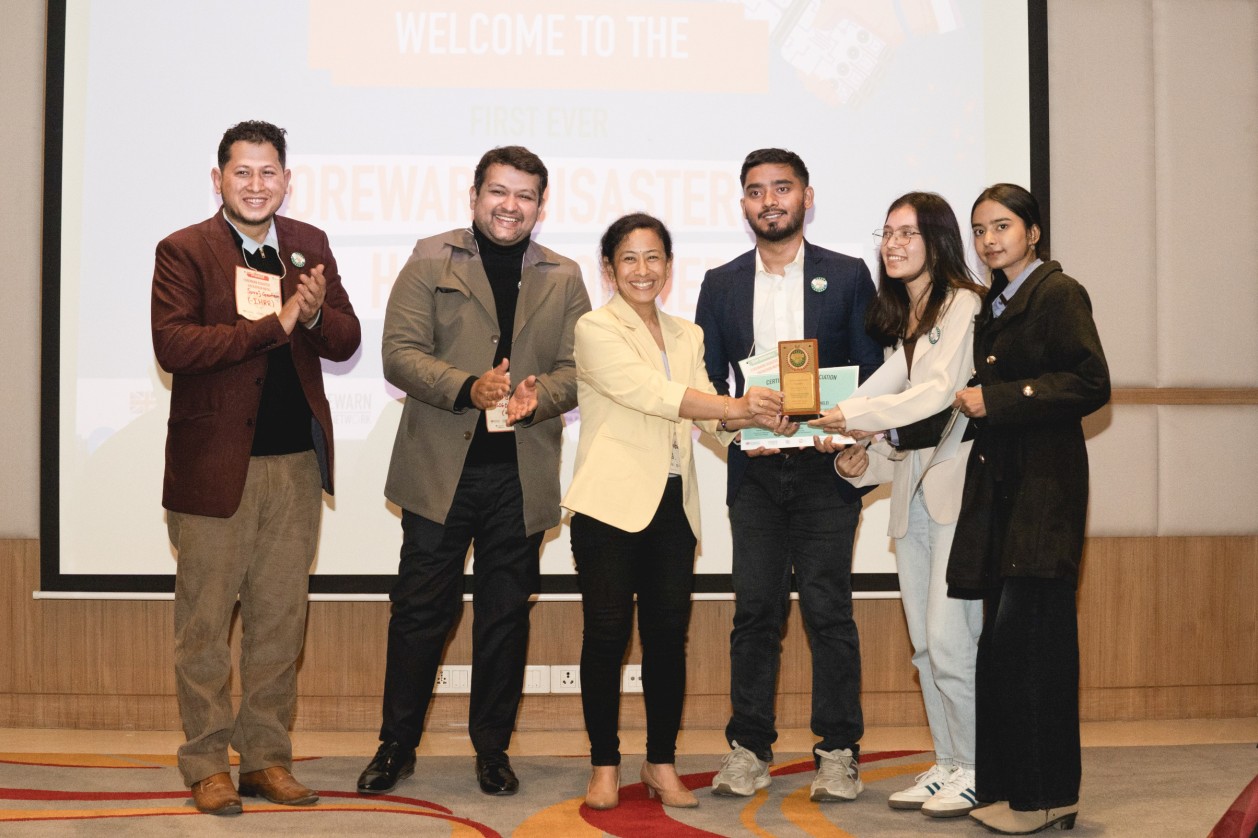
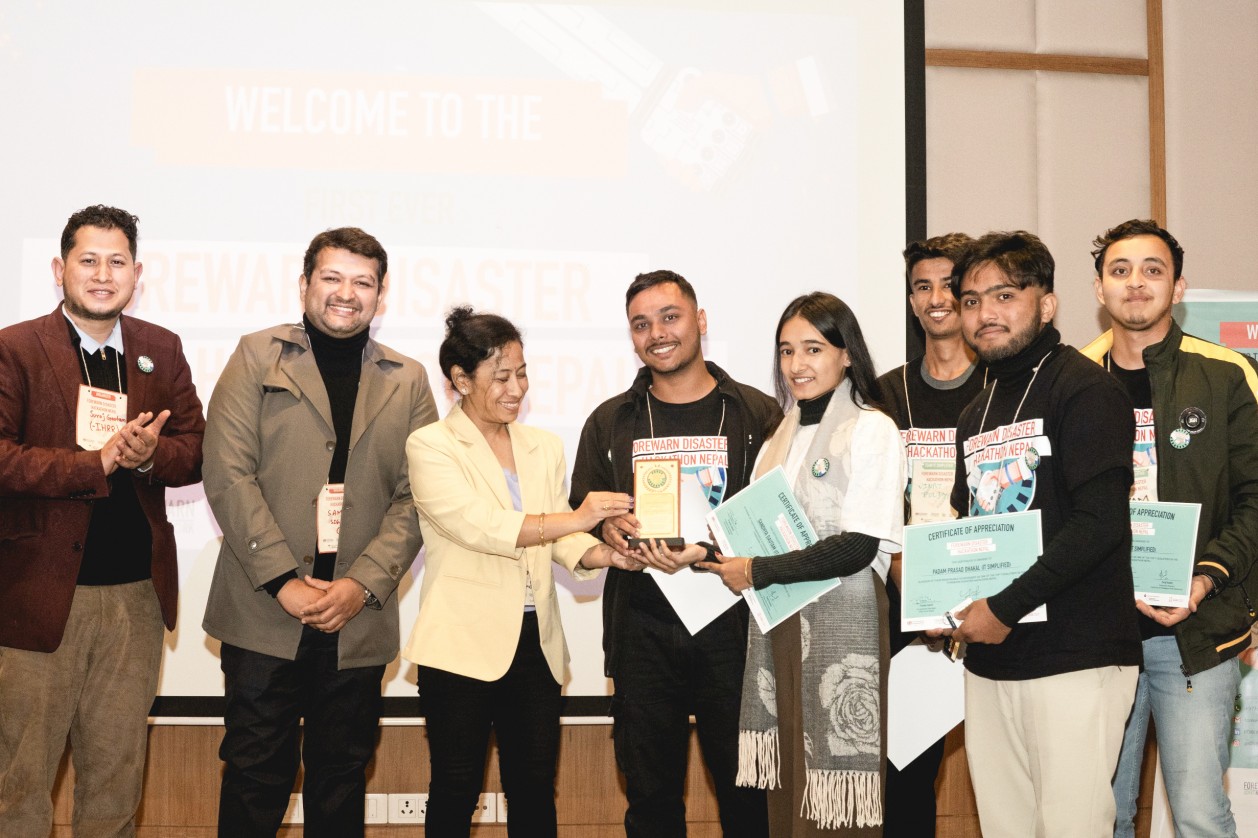
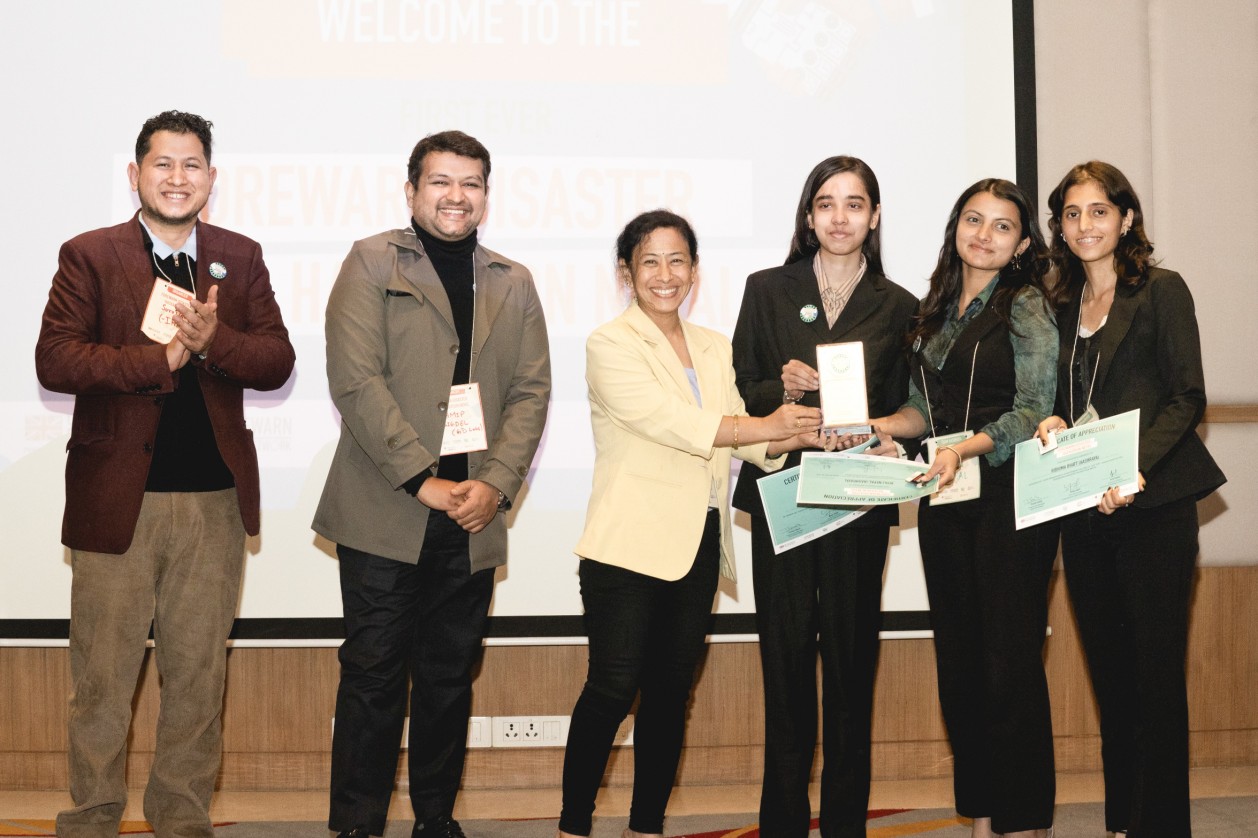
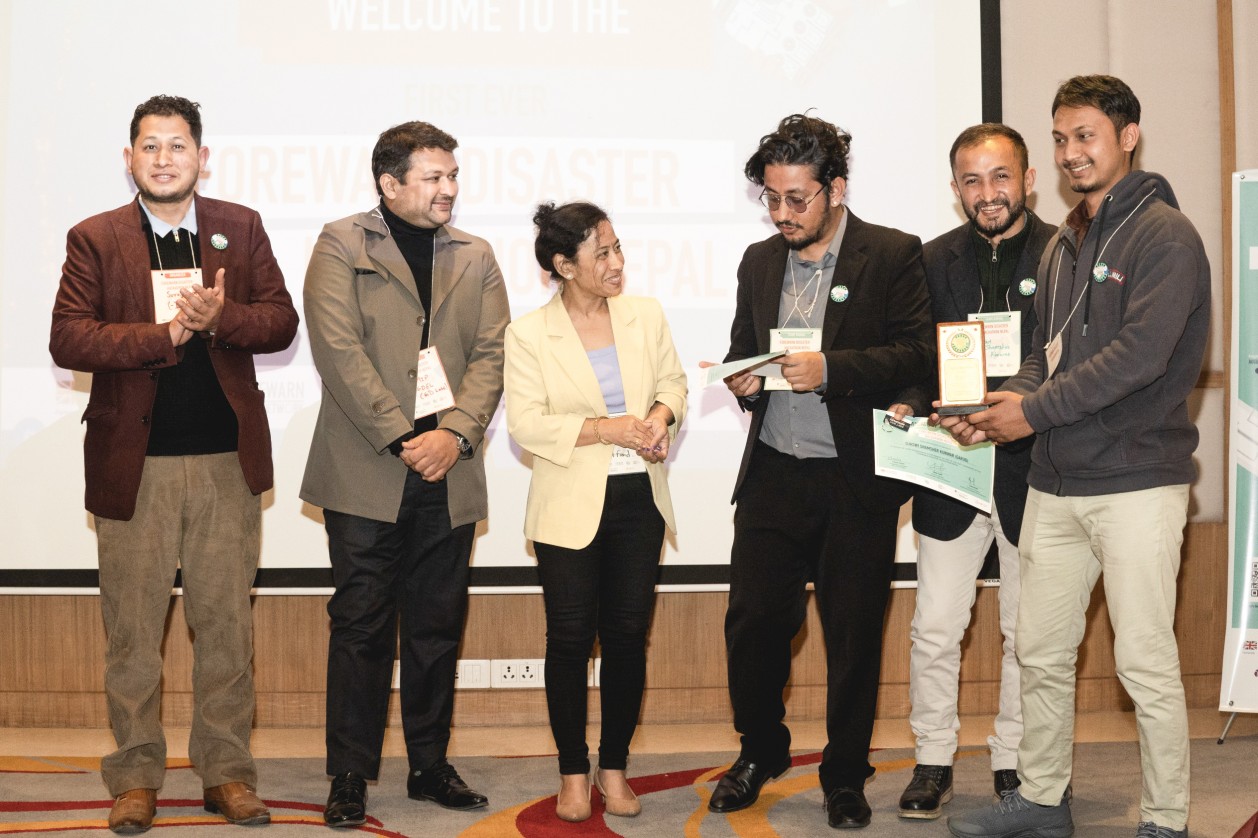
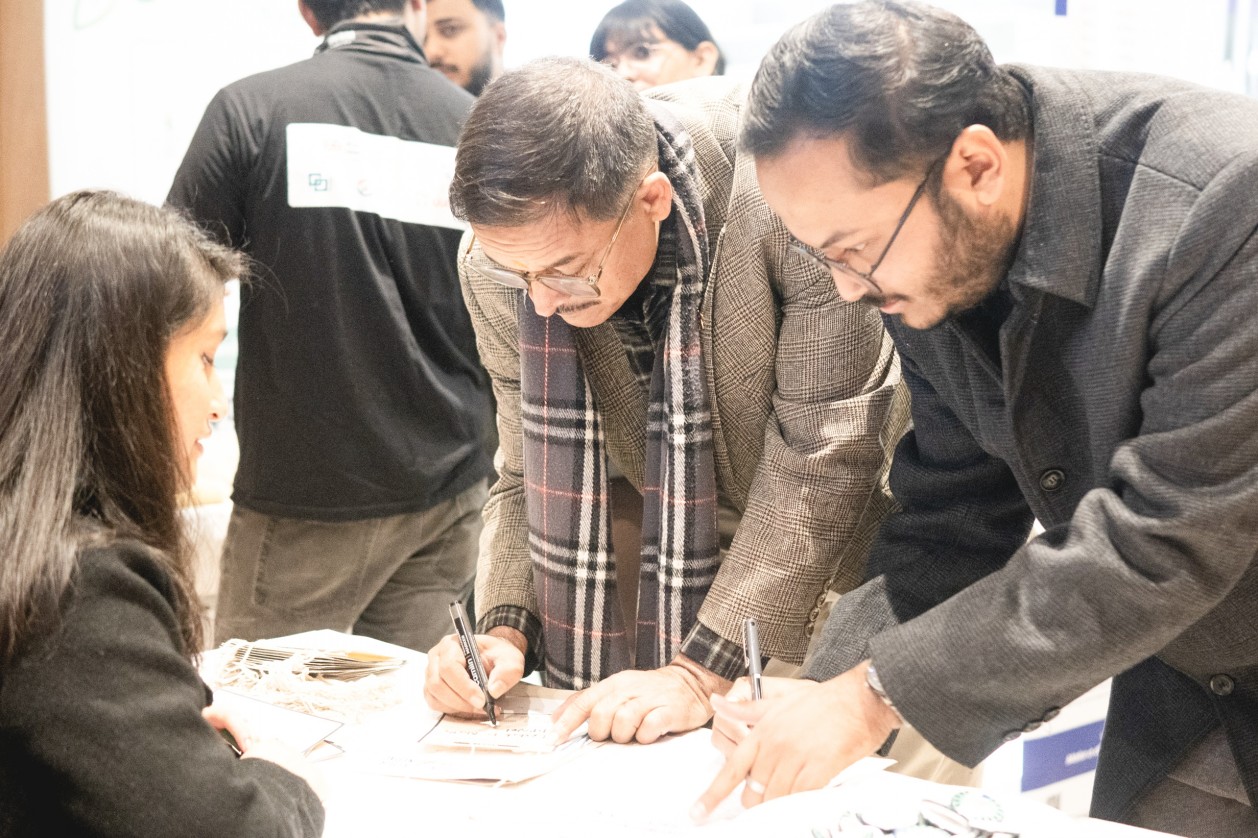
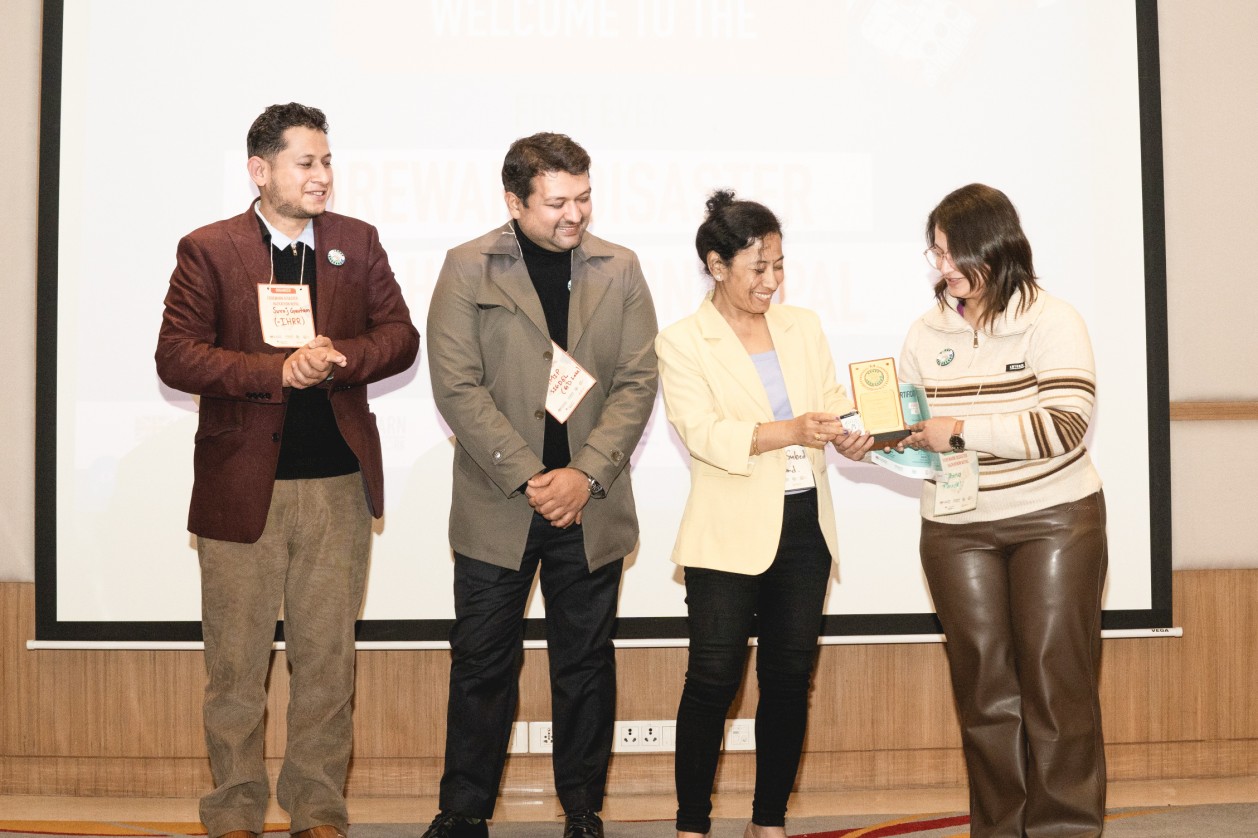
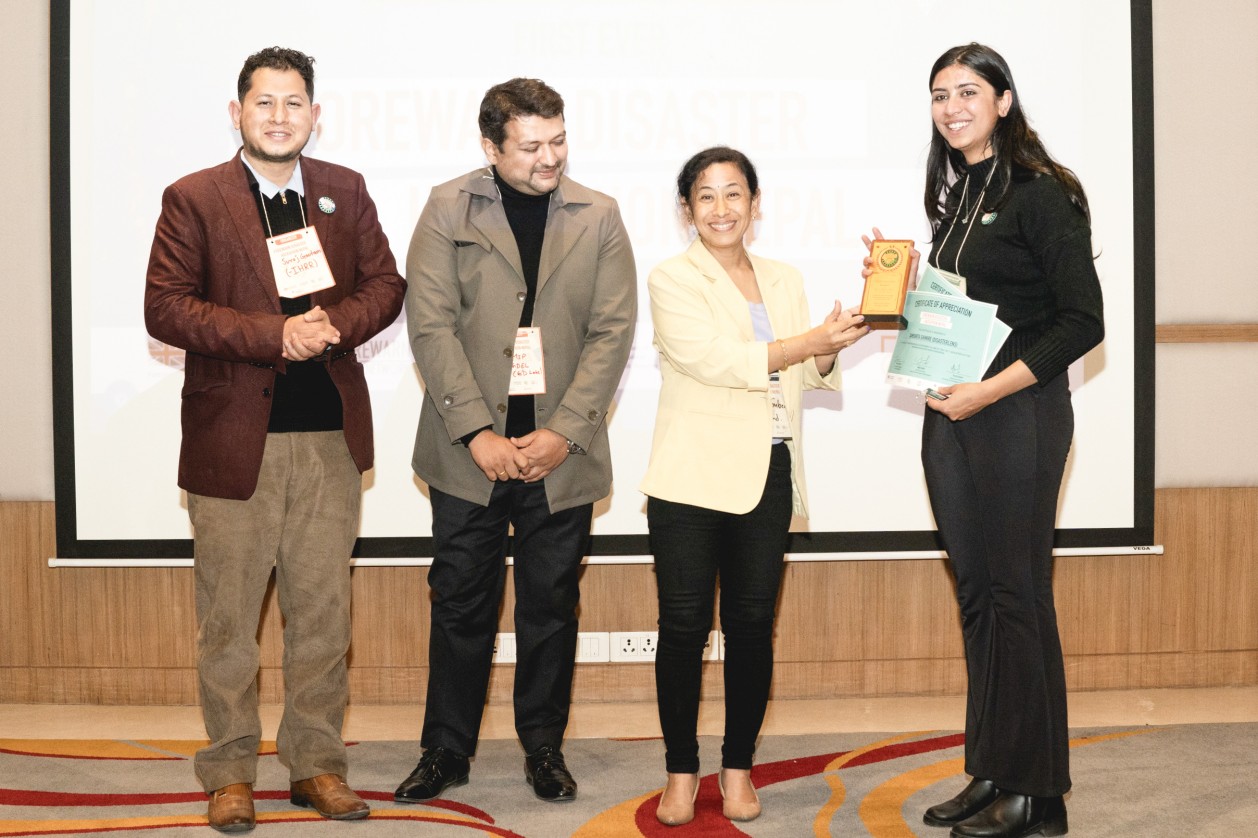
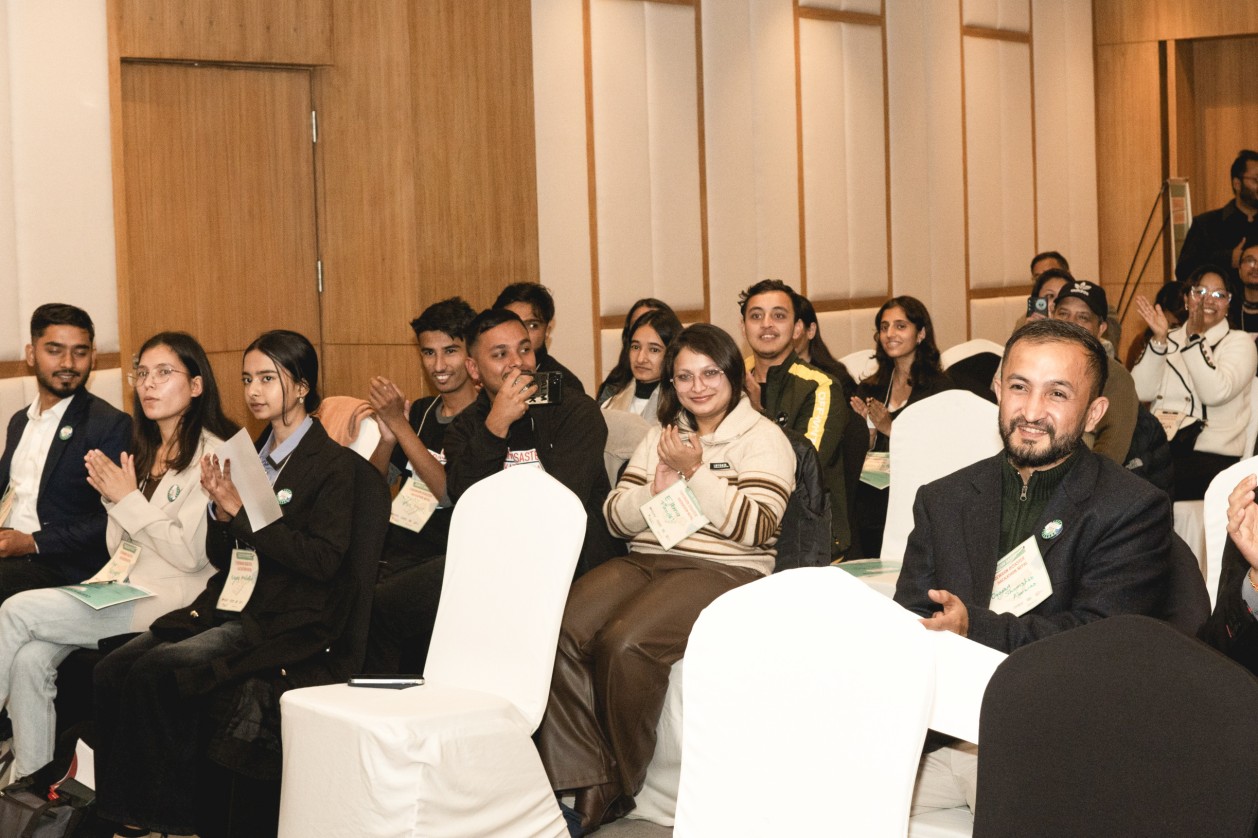

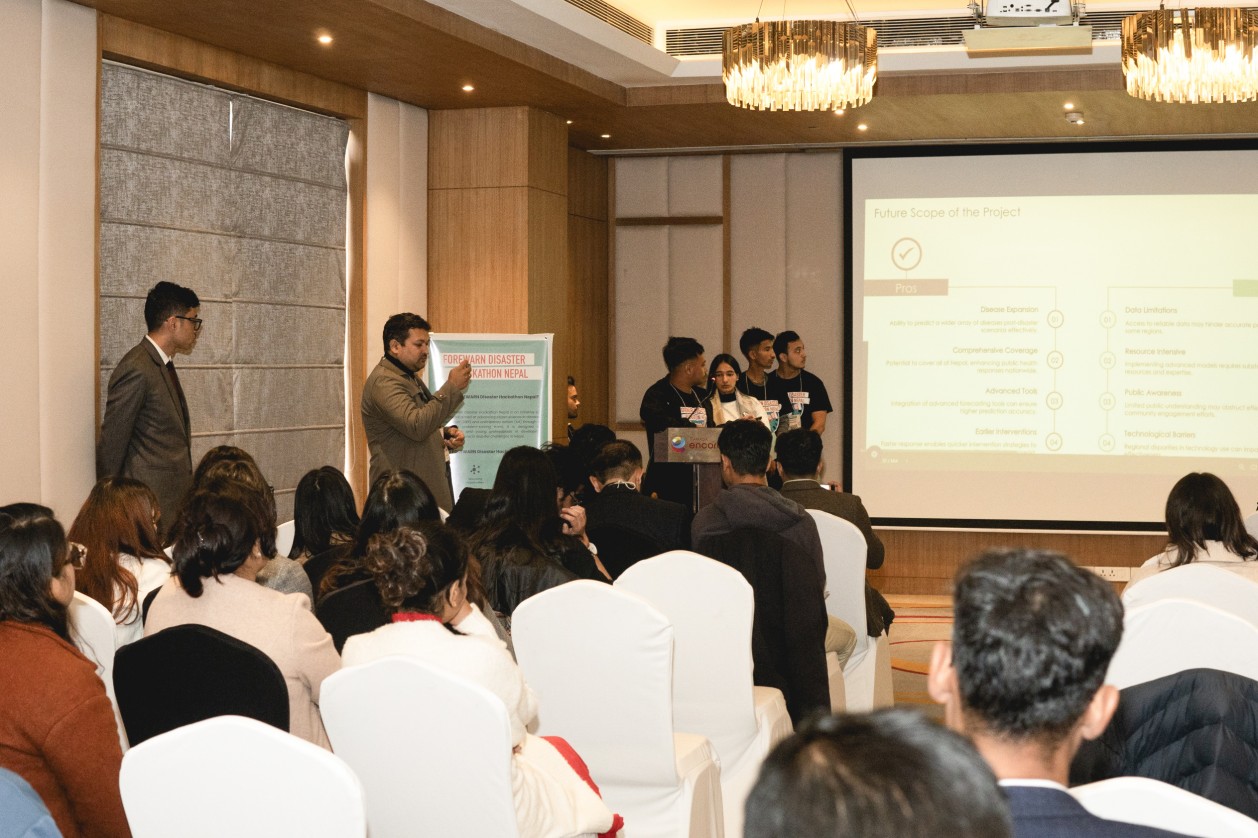
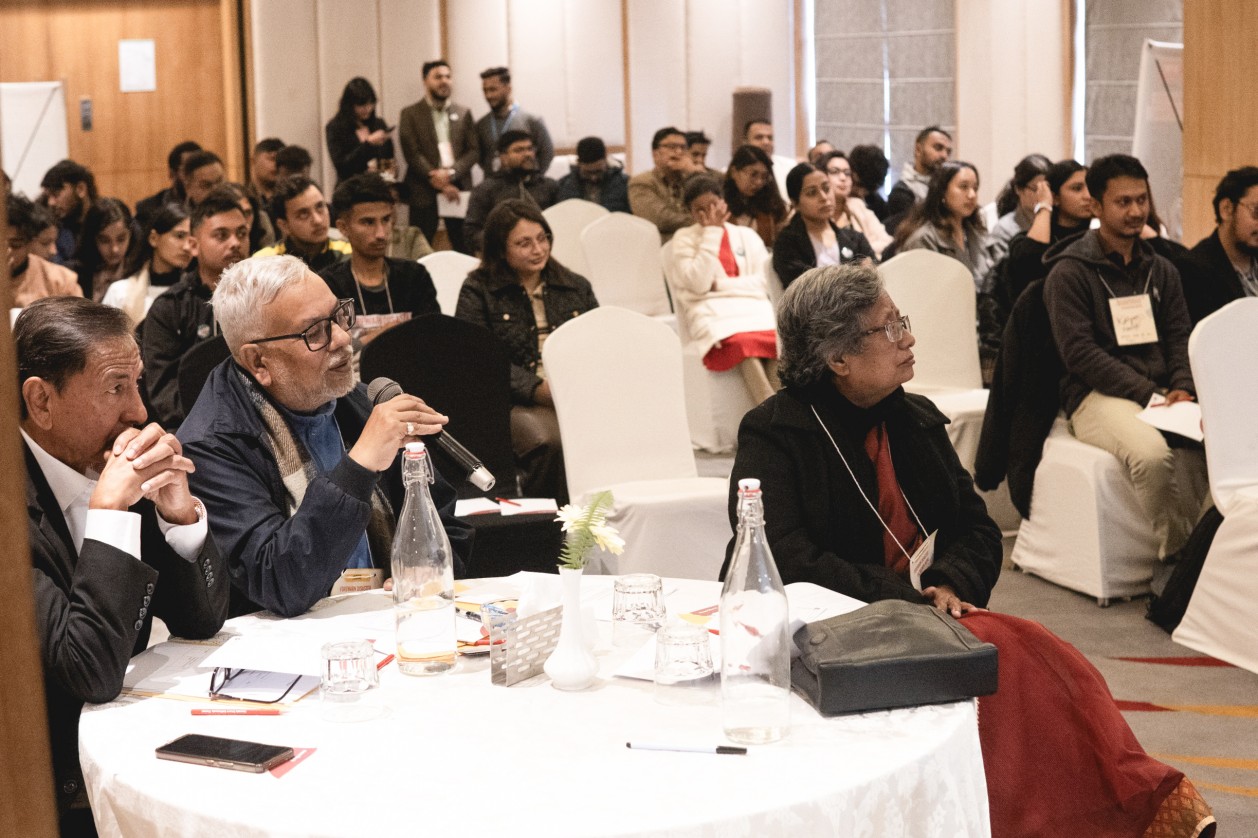
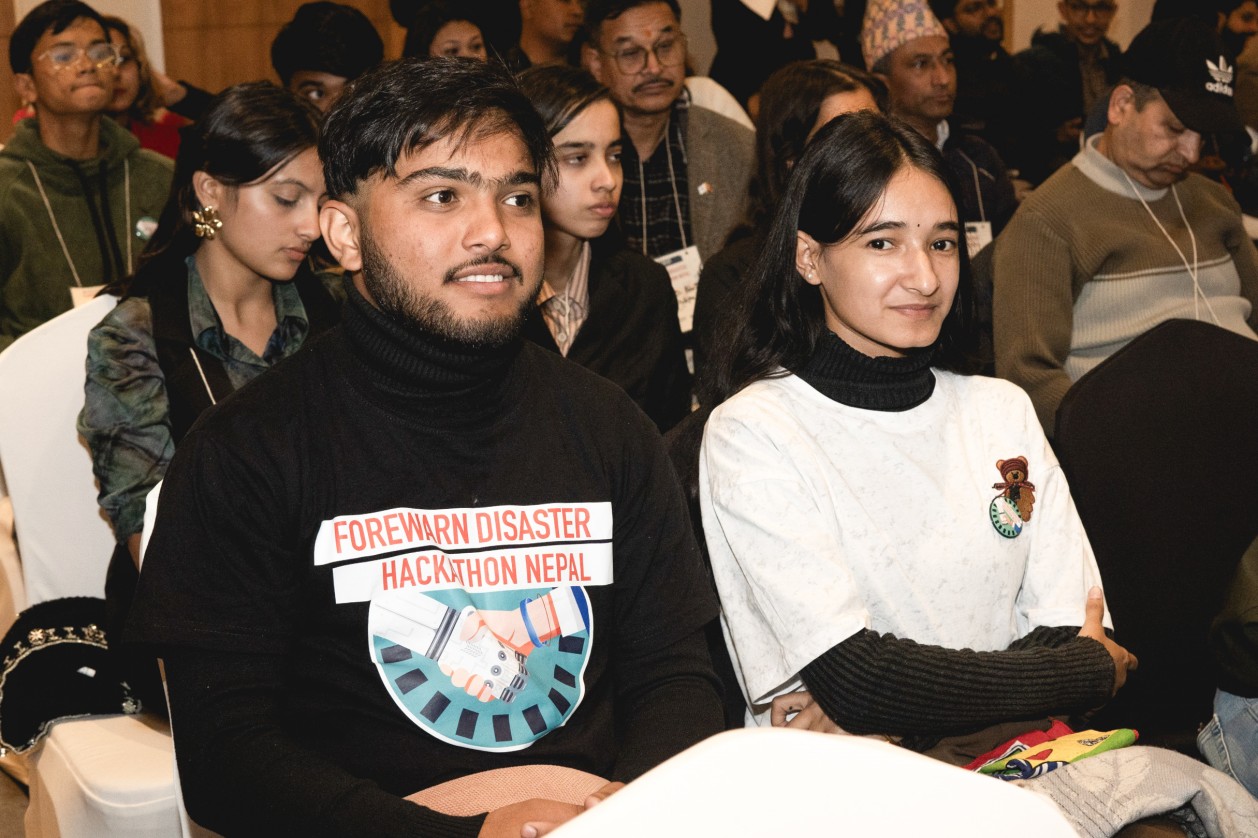
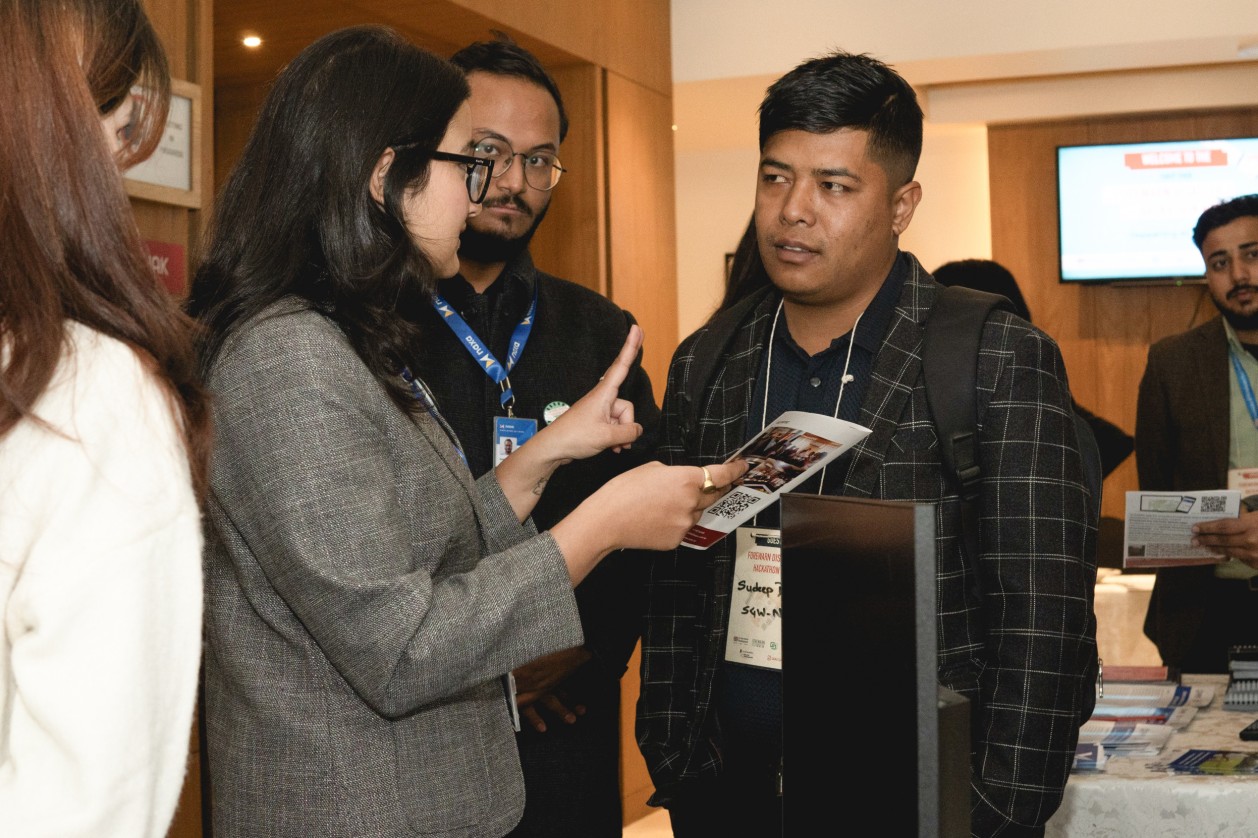
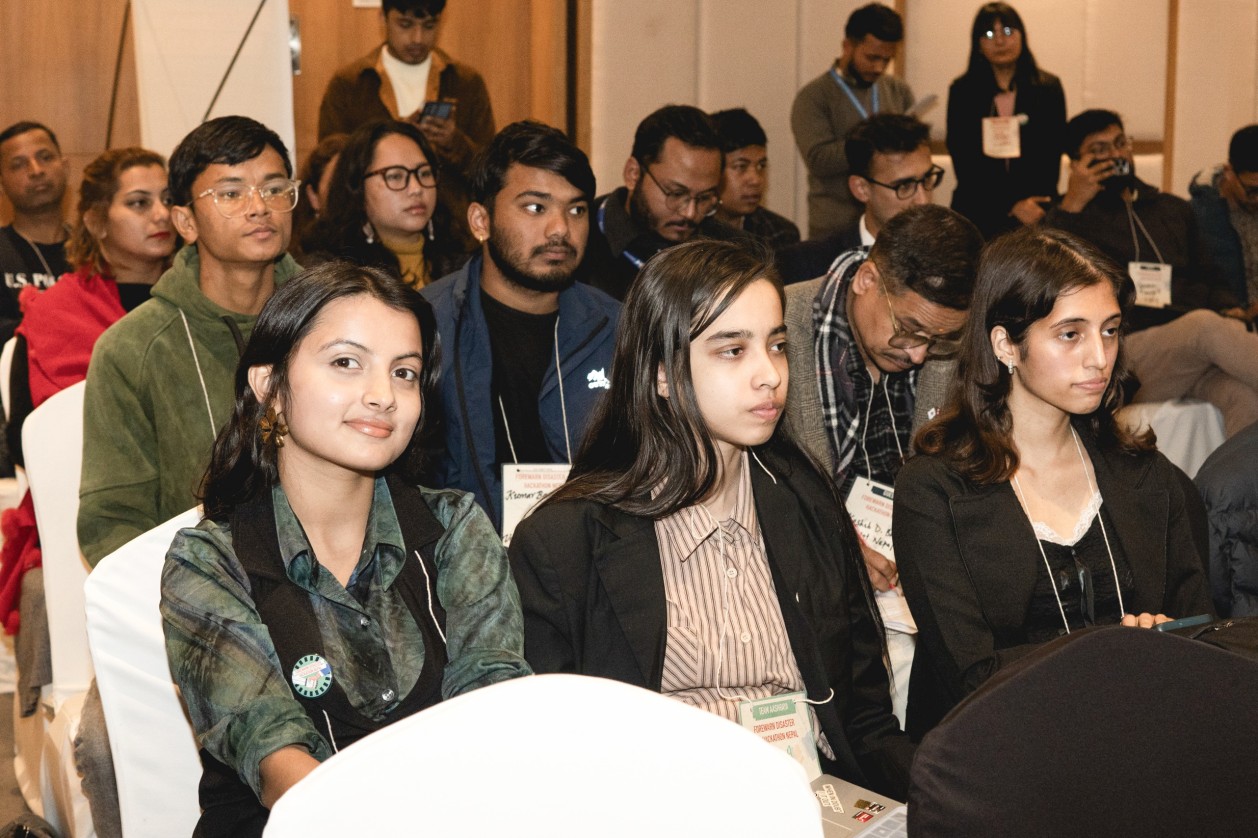
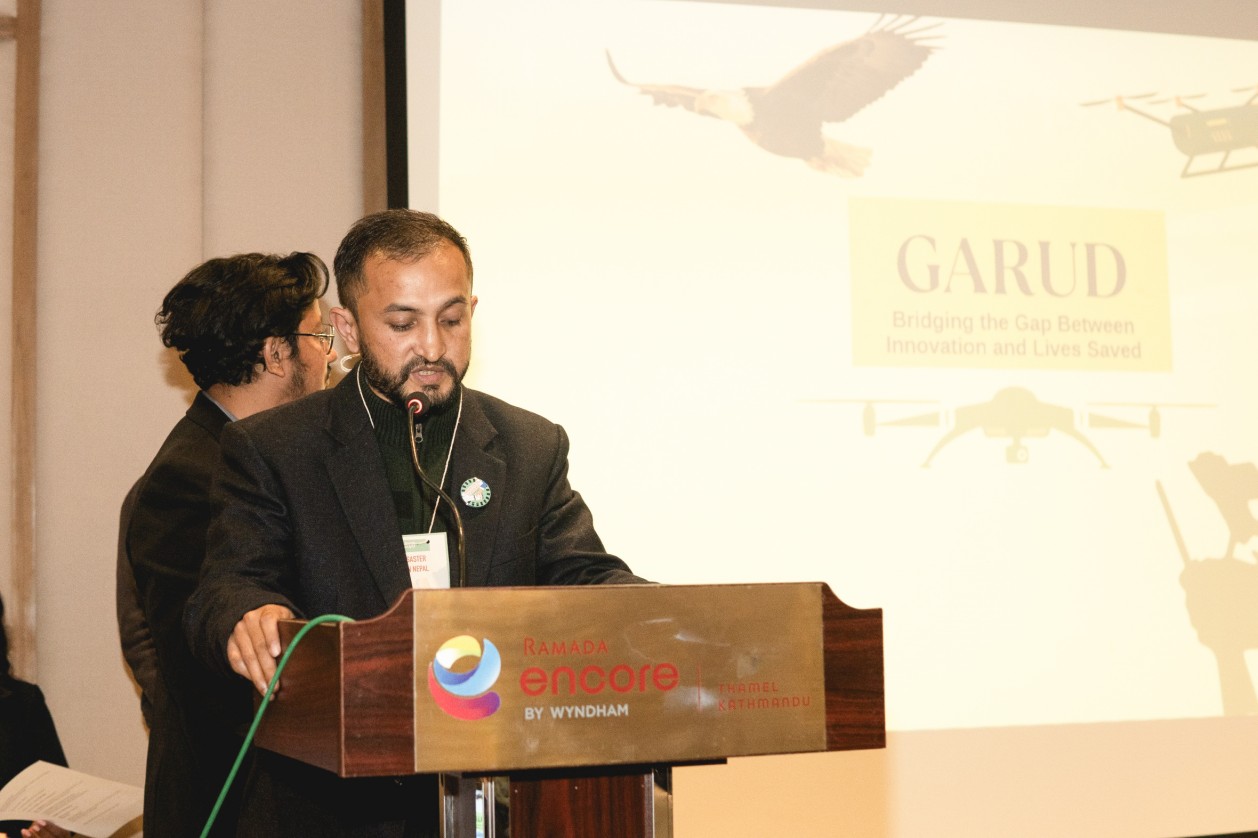
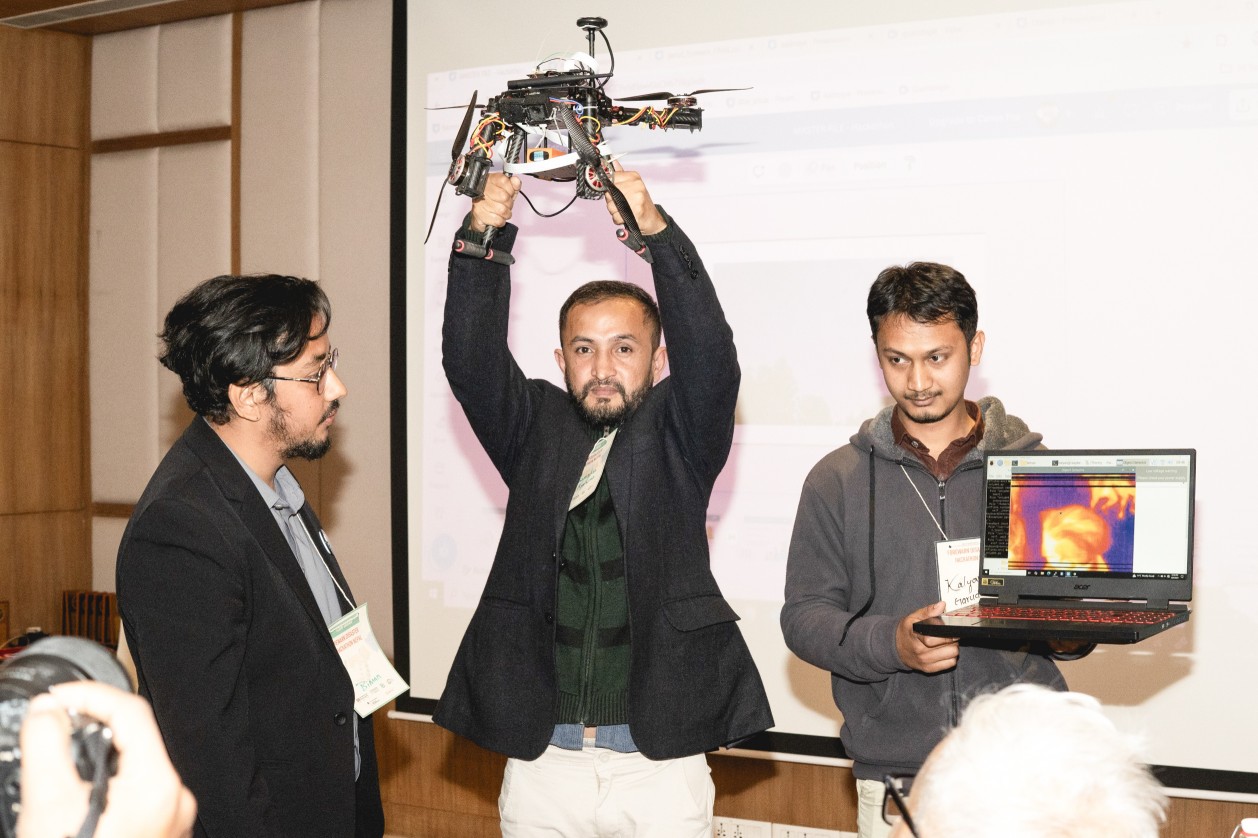
The finalists demonstrated how their prototypes aligned with Nepal’s disaster risk priorities, offering various solutions. Each team delivered their pitch, followed by an engaging Q&A session, allowing for constructive feedback.
The structured agenda ensured a seamless flow, with scheduled breaks for participants to reflect and recharge. This grand finale celebrated innovation and collaboration, emphasizing the importance of actionable ideas to strengthen Nepal’s resilience against disasters.
Judge Panel for the Final Pitching Session of FOREWARN Disaster Hackathon Nepal
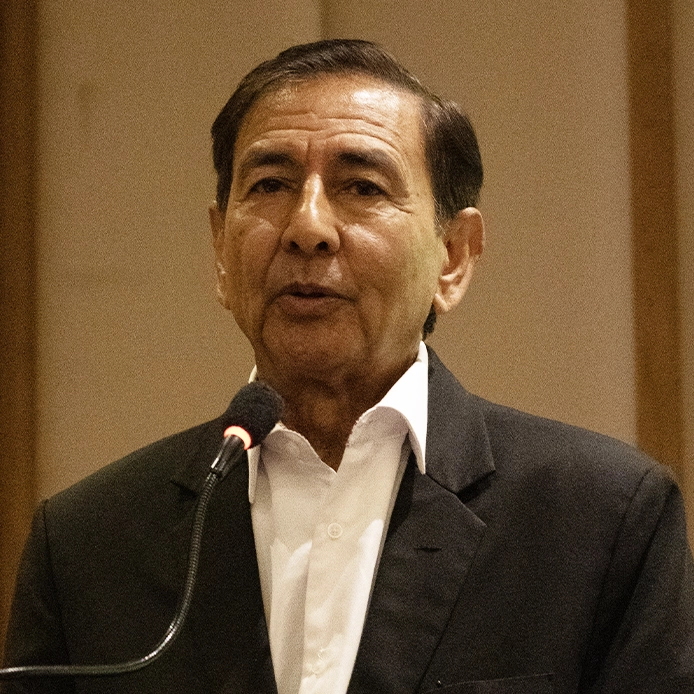
Dr. Meen Bahadur Poudyal Chhetri
A disaster management and economics expert with a Ph.D. from the University of Vienna and a Post-Doctorate from QUT, Australia. Dr. Chhetri is an Executive Member of NCDM, Adviser to DPNet-Nepal, and Chair of TIEMS’ Paper Review Committee. With 34 years of government service, he brings expertise in disaster policy and economic feasibility.
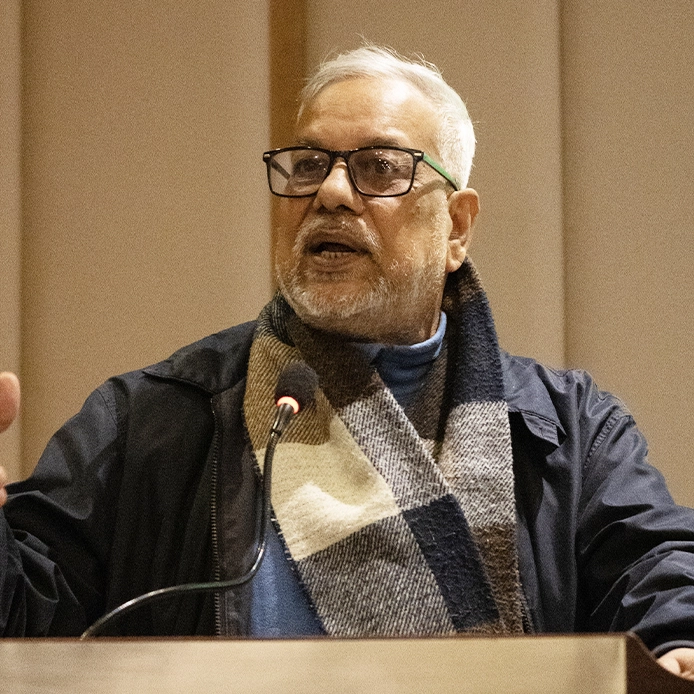
Mr. Shankar Koirala
A former Secretary of General Administration in Nepal’s Ministry of Federal Affairs, Mr. Koirala holds master’s degrees in Political Science and Tourism Planning. With over 15 years of government experience, he specializes in governance, policy development, and capacity building. His expertise in planning and administration ensures scalable, policy-aligned solutions for sustainable impact.
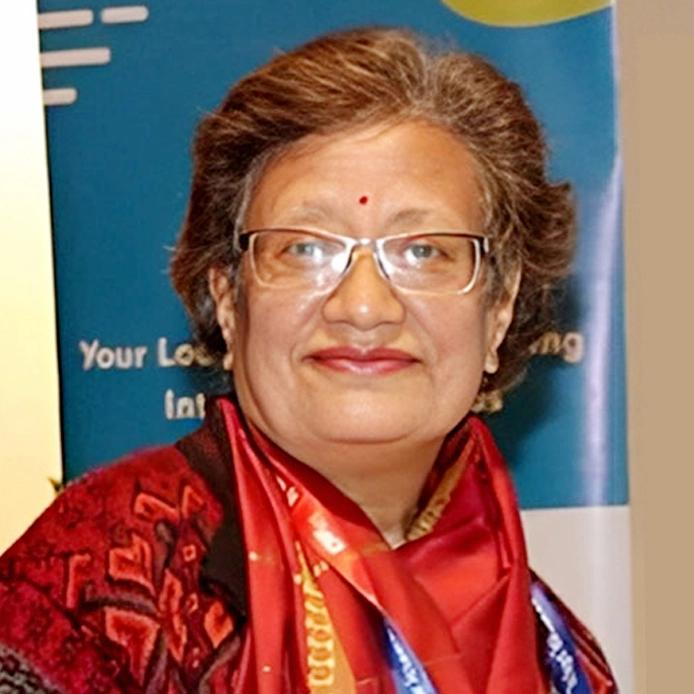
Mrs. Timila Yami Thapa
A pioneer in Nepal’s technology and engineering education, Mrs. Thapa holds an M.S. in Information Technology (De Montfort University). She initiated Nepal’s first Computer Engineering program and has been instrumental in promoting women’s empowerment, child education, and youth employment. Her insights focus on technical innovation and global standards.
After rigorous evaluation by all of the judges, the top 3 teams of the FOREWARN Disaster Hackathon Nepal were announced on the same date.
Winners of FOREWARN Disaster Hackathon Nepal
Winner: Team Garud
First Runner-Up: Team Quantangle
Second Runner-Up: Team: Khai Khola
Winners of Disaster Video Competition
In addition to the pitching session, the event also celebrated the winners of the Disaster Video Competition, recognizing impactful storytelling and audience engagement.
Kumar Basnet
[First Runner-Up]
Avyash Raj Chalise
[Winner]
Ashwin Bist
[Second Runner-Up]
Along with the winners of Disaster Video Competition, the participants of the video with the most number of Likes and Views were also awarded with an Appreciation Certificate:
Video with the most Likes: Shristi Pandey [616 Likes]
Video with the most Views: Sandip Malla [9724 Views]
In Conclusion
The FOREWARN Disaster Hackathon Nepal concluded on a high note, celebrating the ingenuity and determination of participants to address Nepal’s disaster challenges. The final pitching session and awards ceremony showcased not only the innovative solutions developed by the teams but also the collaborative spirit that underpinned the entire event.
By fostering creativity, technical excellence, and a deep understanding of disaster risk reduction, the hackathon successfully brought together diverse talents to inspire actionable change. This landmark event reaffirmed the power of community-driven innovation in building a more resilient and disaster-prepared Nepal.
Possible Themes for FOREWARN Disaster Hackathon Nepal
Disaster Risk Reduction and Management
- Landslide and Earthquake Prediction: Analysis of geological data and satellite imagery to predict and monitor landslides and earthquakes, which are prevalent in Nepal.
- Flood Monitoring and Early Warning Systems: Early warning systems to use real-time data from river basins, rainfall patterns, and weather forecasts to issue timely alerts
- Real-Time Alerts (esp. for transportation and tourists): Real-time disaster alert systems for toursists and transport sector preparing them or alerting them beforehand.
Climate Change Adaptation
- Glacial Lake Outburst Flood (GLOF) Monitoring: AI and remote sensing technologies to monitor glacial lakes in the Himalayas, predicting potential outburst floods and enabling early interventions.
- Agricultural Resilience: Analyzing climate data, soil health, and pest patterns, supporting farmers in adapting to changing climate conditions.
Public Health Surveillance
- Disease Outbreak Prediction: Predicting outbreaks of diseases like dengue, cholera, or COVID-19 by analyzing health records, environmental factors, and social data.
- Medical Service: Critical healthcare access to patients residing in remote/ mountainous parts of Nepal via AI-driven telemedicine technology.
Geospatial Analysis and Remote Sensing
- Forest Fire Monitoring: Analysis of satellite imagery to detect and predict forest fires, which are a growing concern in Nepal, particularly during the dry season.
- Deforestation and Environmental Degradation: Monitor deforestation and land degradation, providing actionable insights for conservation and reforestation efforts.
Infrastructure Management and Urban Planning
- Building Structure Categorization: Analysis of building materials for specific regions of Nepal in terms of sustainability, longevity and hazard reduction.
- Traffic Management and Disaster Evacuation: Optimize traffic flow and manage evacuation routes during emergencies, addressing the challenges of densely populated urban areas.
Water Resource Management
- Irrigation System Optimization: Optimize irrigation practices by analyzing weather patterns, soil moisture levels, and crop water needs, critical for Nepal’s agrarian communities.
- Water Quality Monitoring: IOT sensors to monitor the quality of drinking water, especially in rural and remote areas, helping to prevent waterborne diseases.
Community-Based Early Warning Systems
- Local Language AI Chatbots for Information Dissemination: Deploy AI chatbots in local languages to disseminate early warnings and emergency information, ensuring accessibility for all communities, including those in remote areas.
- Mobile-Based Early Alerts: SMS-based or app-based alert systems that notify people of impending disasters in real time
Cultural Heritage Preservation
- Monitoring of Heritage Sites: Prevention of damage to heritage sites due to natural disasters like earthquakes, flooding via. monitoring using AI predictors and usage of drones.
Governance
- E-Risk Governance for Accountable Disaster Management:
- Development of a blockchain-based system for tracking the distribution of aids.
- Designing a platform that facilitates communication and collaboration between different stakeholders involved in disaster management.
- E-Risk Governance for Accountable Disaster Management:
- Smart DRR Governance:
- Information dissemination platform for DRR issues within the governmental and non-governmental bodies.
- DBMS portal for Anticipatory Action.
Create Your Own Statement
Identify a challenge unique to what you believe demands attention in a disaster situation and present your own idea on how the challenge can be solved through an innovative approach.
FAQs about FOREWARN Disaster Hackathon Nepal
General Information
The FOREWARN Disaster Hackathon Nepal is an initiative by Start Network aimed at advancing citizen science in disaster risk reduction (DRR) and anticipatory action (AA) through a collaborative problem-solving event. It is designed to engage youth and young professionals in developing innovative solutions to disaster challenges in Nepal.
The hackathon is open to students, young professionals, researchers, practitioners and enthusiasts in disaster risk reduction, climate action, environmental sciences, and related fields. Participants should have a strong interest in anticipatory action and disaster preparedness. Participants from any background can challenge this Hackathon, however should be able develop a solution towards the existing problem. The participating team can be composed of a Single individual, or a group of individuals or a group of organizations as well. This should be clearly stated in the submission window.
The main objective is to raise capacities of youth and young professionals in Disaster Risk Management and Anticipatory action by fostering innovation, collaboration, and practical solution development.
This event is an initiative of Start Network, a network of aid agencies across the world, working together to revolutionize the global humanitarian system. It is planned, coordinated and organized in Nepal by Green Decision Labs & Research Pvt. Ltd. (GD Labs) in a joint venture with Institute of Himalayan Risk Reduction (IHRR).
Application and Selection Process
Interested participants can apply through an online registration form, which will be made available on the official website and social media channels. Each Submission will be considered as one “Participating Team”. Participants can apply individually or as a team. Similarly, the participating team can submit only one solution. The registration will tentatively be open from 24th August, 2024.
Participants will be selected based on their academic background, experience in DRR or related fields, feasibility/scale of the solution, User experience and design of the solution, and their motivation for participating in the Hackathon. A diverse group of participants will be chosen to encourage varied perspectives and solutions.
Selected participants will be notified within one week after the application deadline. Notifications will be sent via email.
Event Details
A 3-day incubation lab will be conducted over a weekend, following a 3-week cohort program. The activities include training sessions, problem definition workshops, ideation sessions, and prototyping.
Participants will receive technical guidance, mentorship from experts, and access to resources related to anticipatory action. They will also have the opportunity to interact with stakeholders and peers.
No, there won’t be any registration fee involved for participating in this event.
Project Development and Resources
Participants are expected to develop innovative solutions, prototypes or a proof of concept and framework addressing specific anticipatory action and disaster challenges. These solutions should be practical, scalable, and aligned with disaster risk reduction goals.
Participants can apply individually or as a team. Individuals, if interested, will later be provided the opportunity to collaborate with relevant teams, allowing for collaborative problem-solving and diverse perspectives in developing solutions.
Participants will have access to training materials, case studies, tools for AA, and continuous mentorship from experienced professionals.
Post-Hackathon
After the Hackathon, the top 3 teams will receive support to further develop and implement their solutions. Additionally, there will be opportunities for ongoing mentorship and engagement with the Associate FOREWARN group.
Yes, initial seed funds and entrepreneurship/networking opportunities will be awarded to the winning teams, and their solutions will be recognized by the organizing partners and stakeholders.
Participants are encouraged to continue refining their projects, and there may be opportunities for further development, implementation, or collaboration with relevant organizations.
Additional Questions
Regular updates will be shared via email, the official website, and social media channels. Participants are encouraged to stay connected for the latest information.
All the updates are also posted through our social media channels:
Important dates, including application deadlines, cohort program start, and Hackathon event dates, will be communicated clearly on our official social media page.

